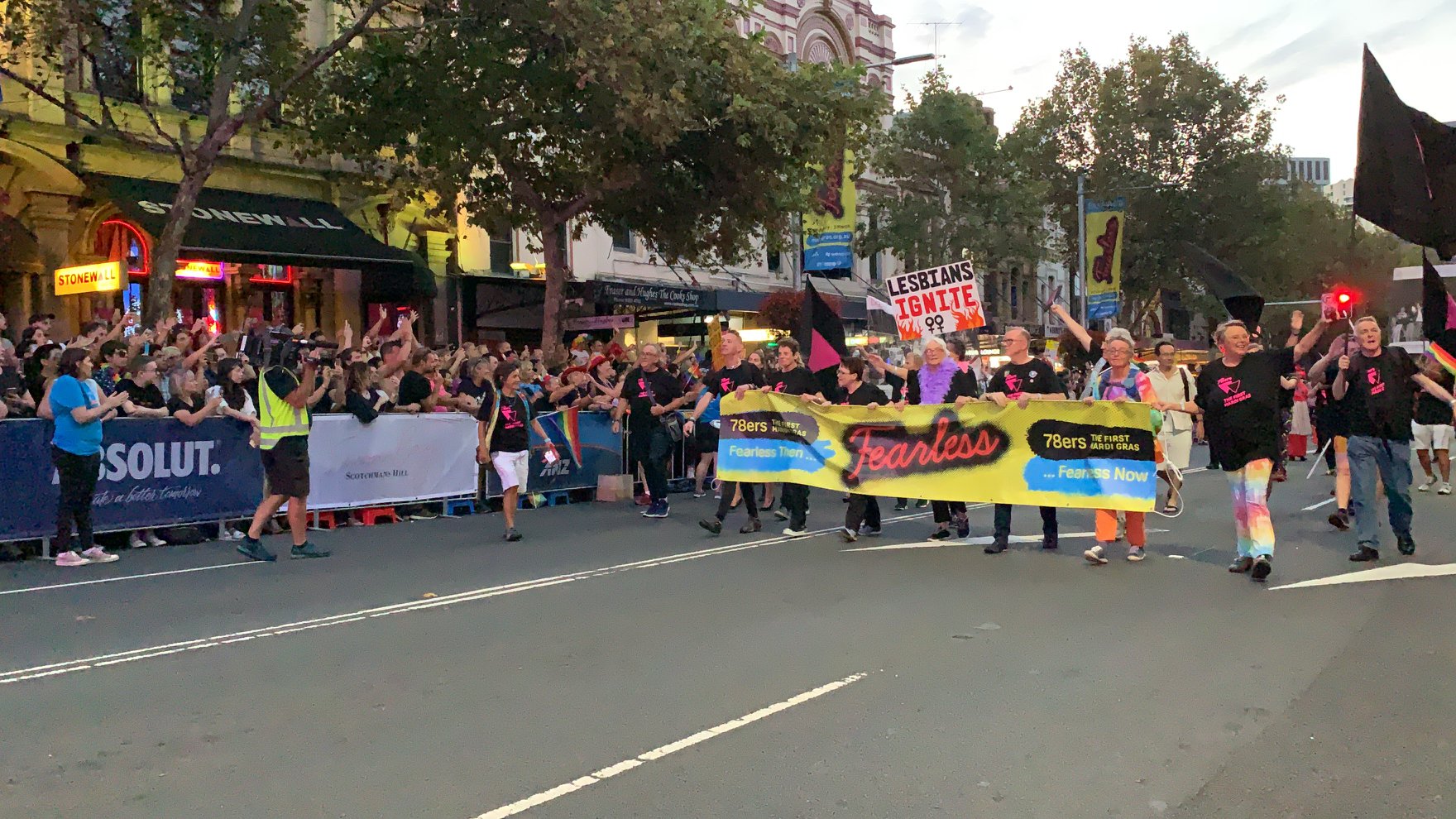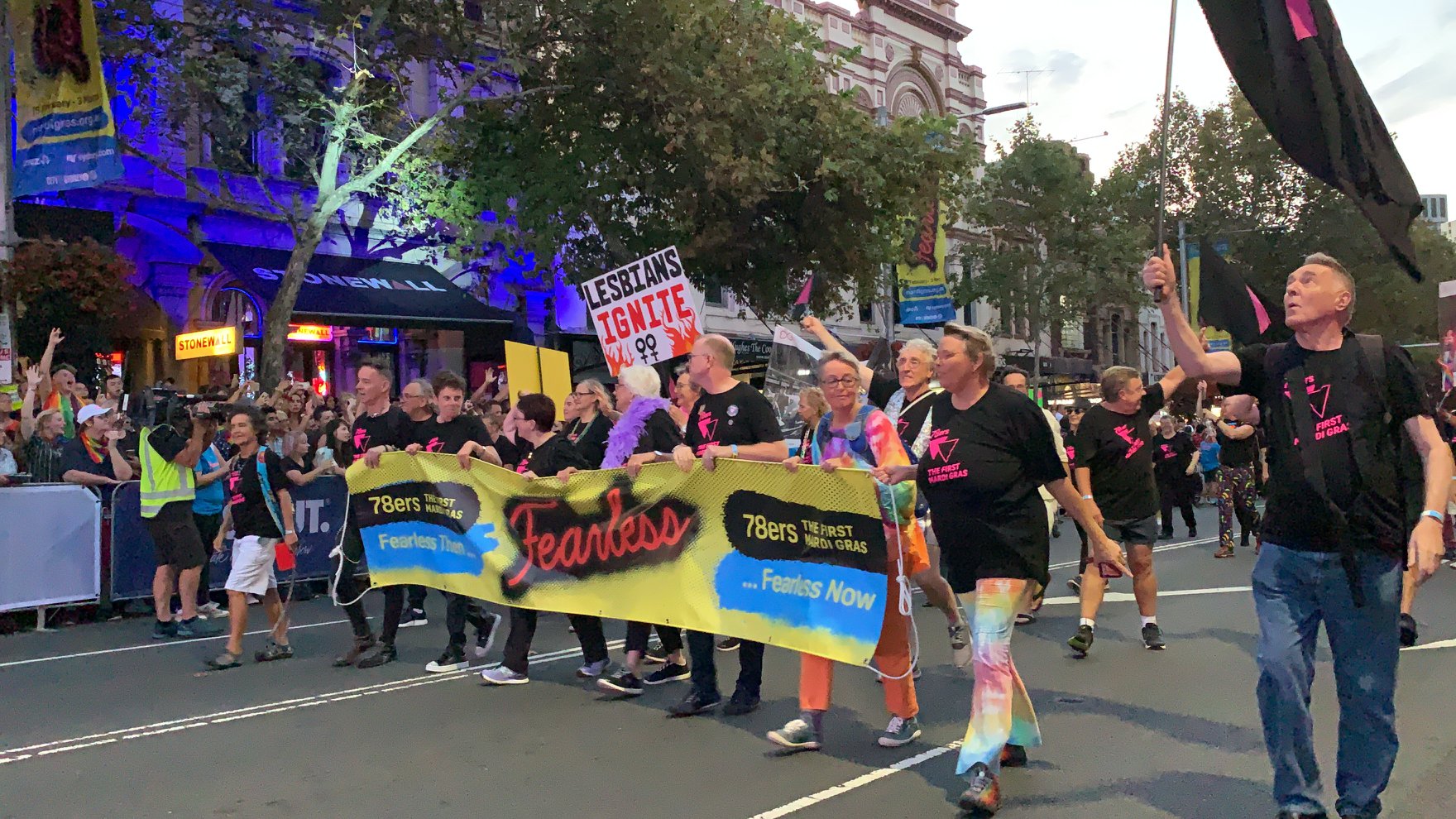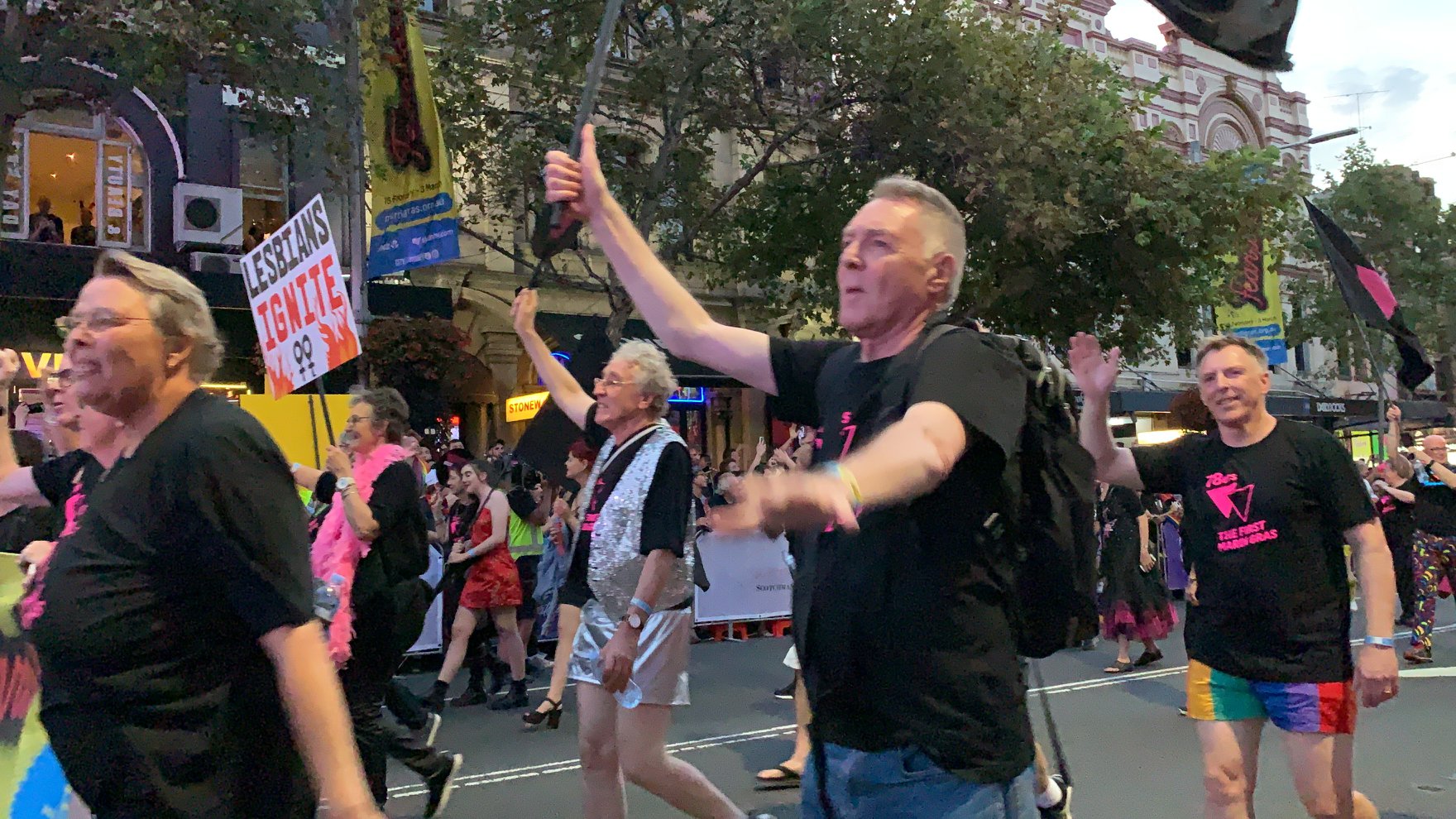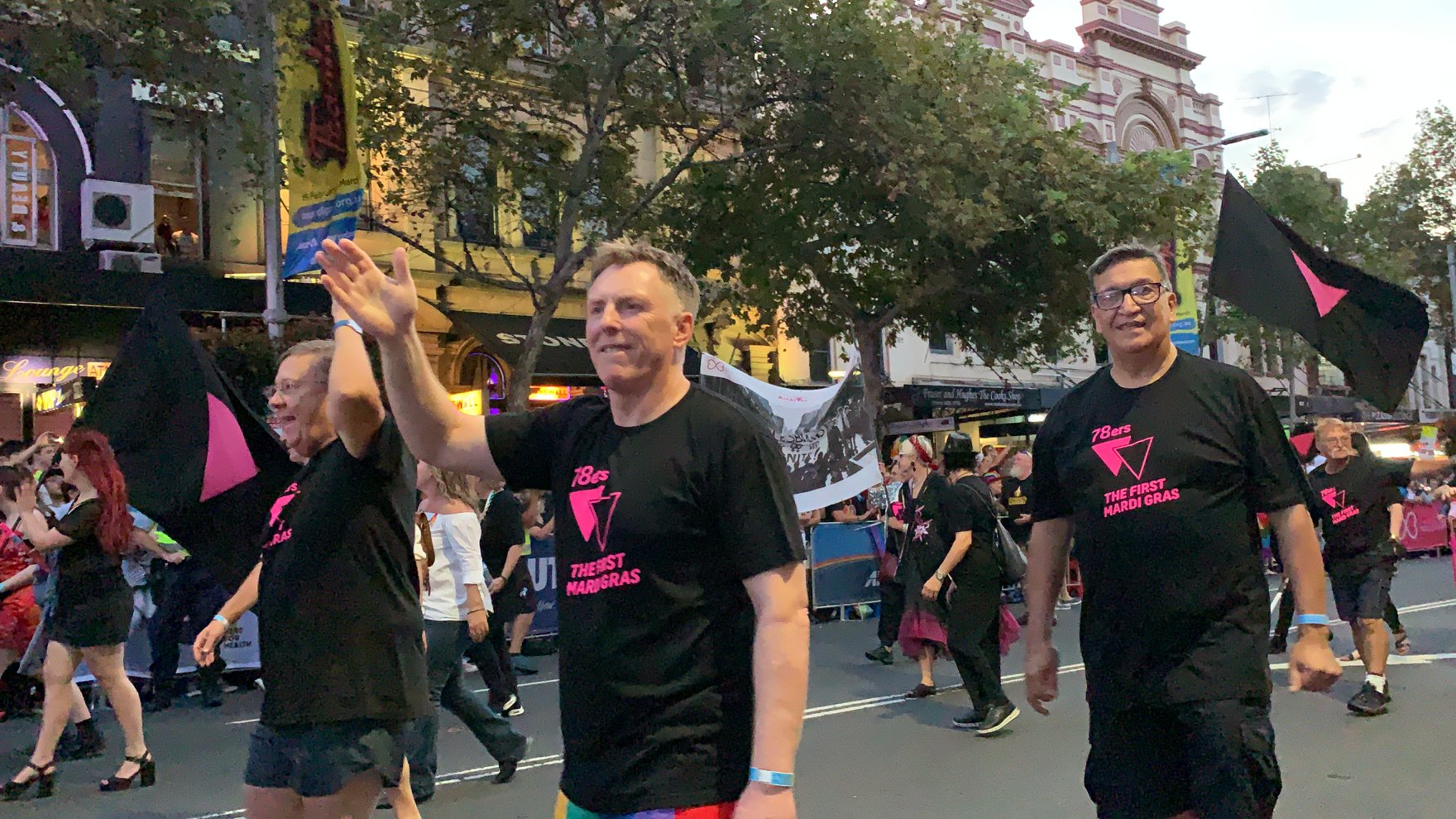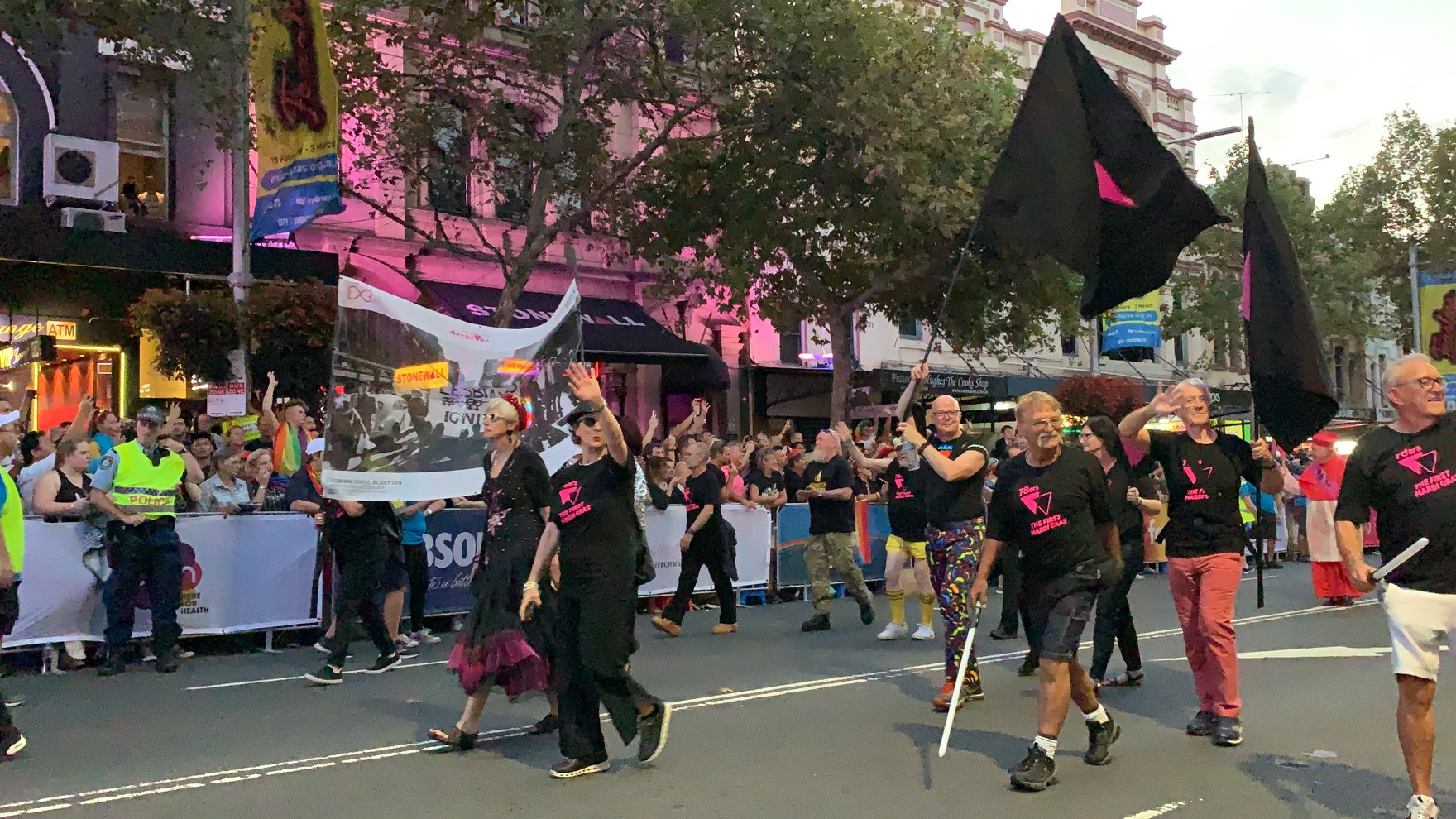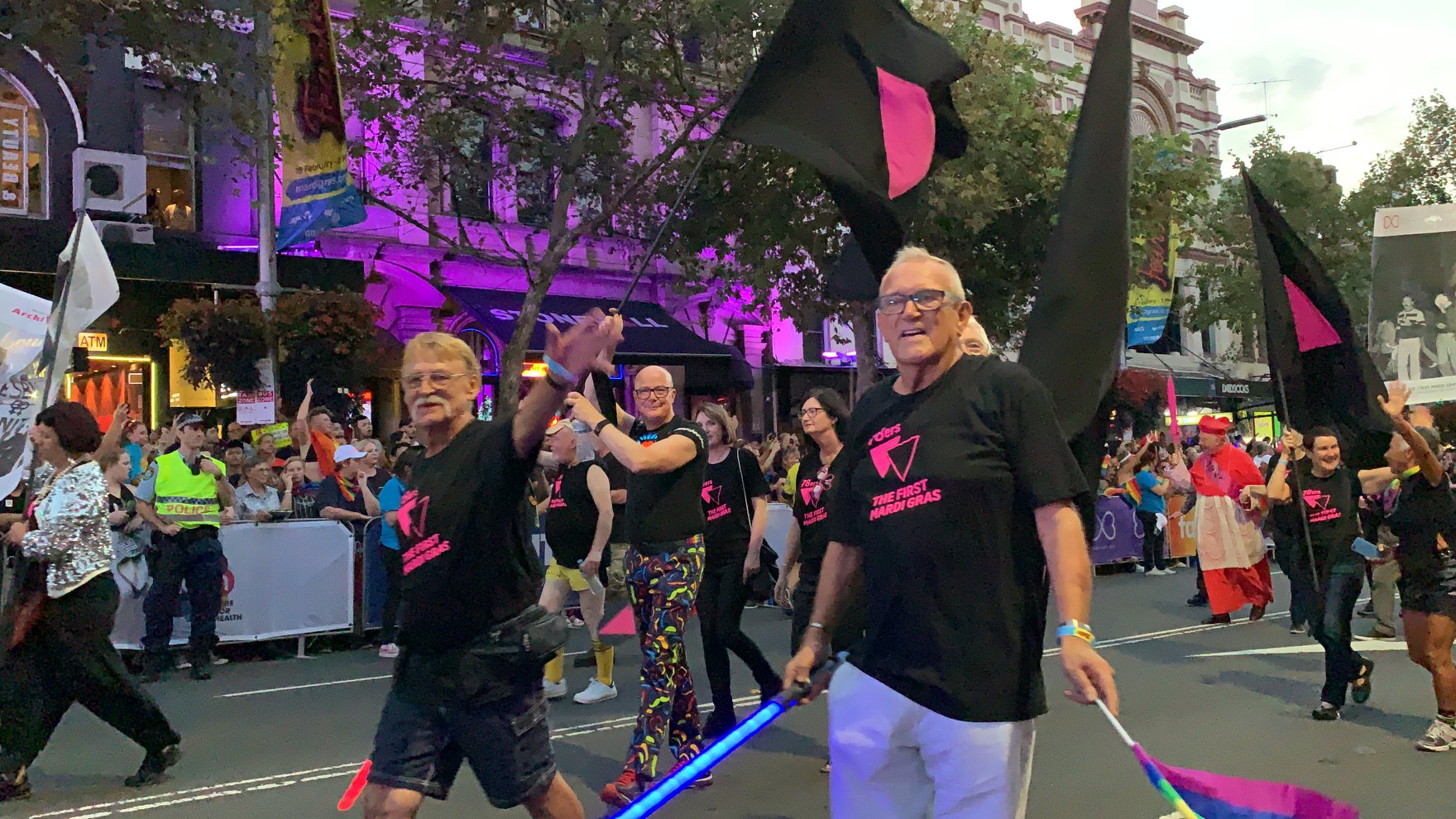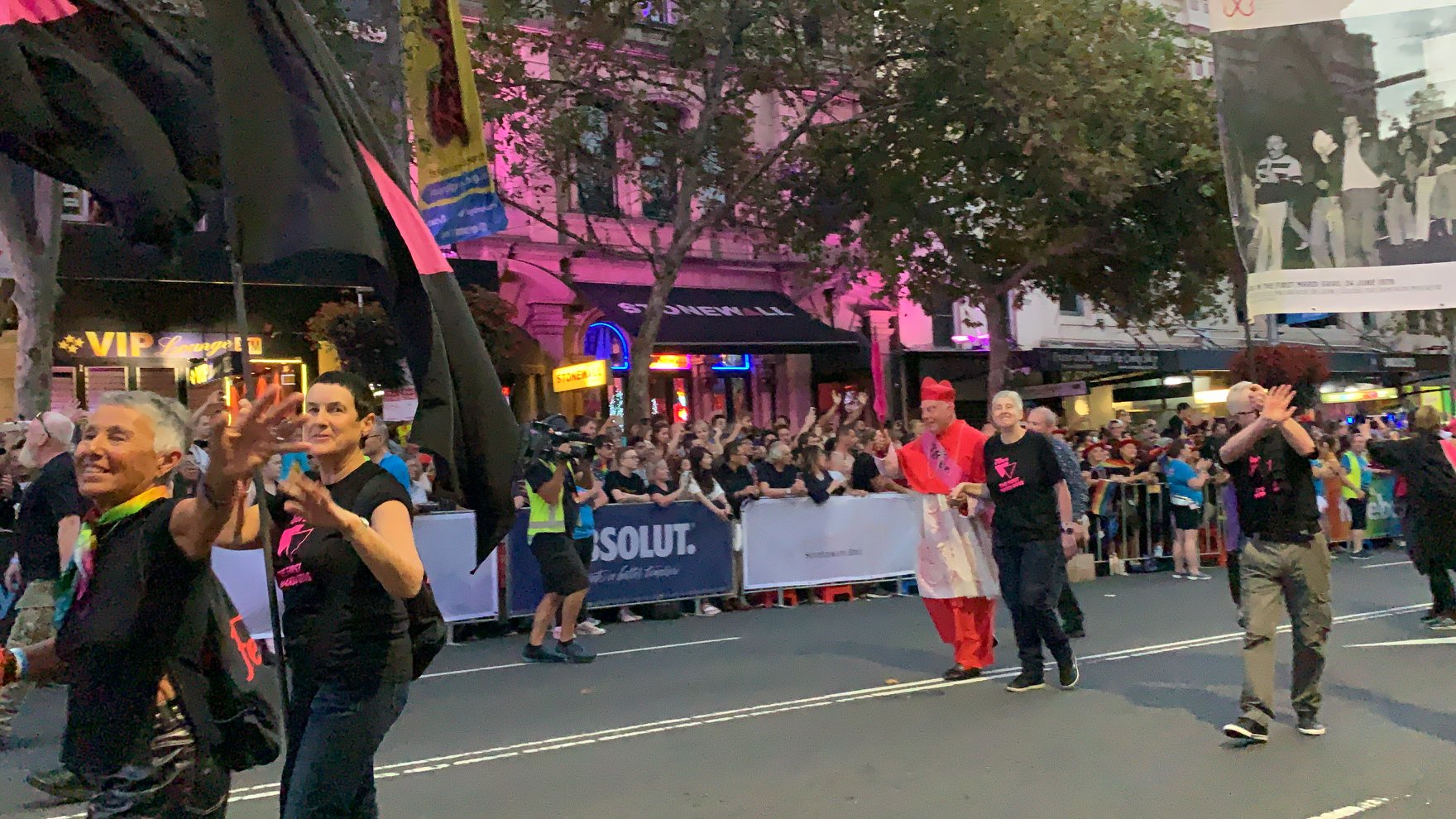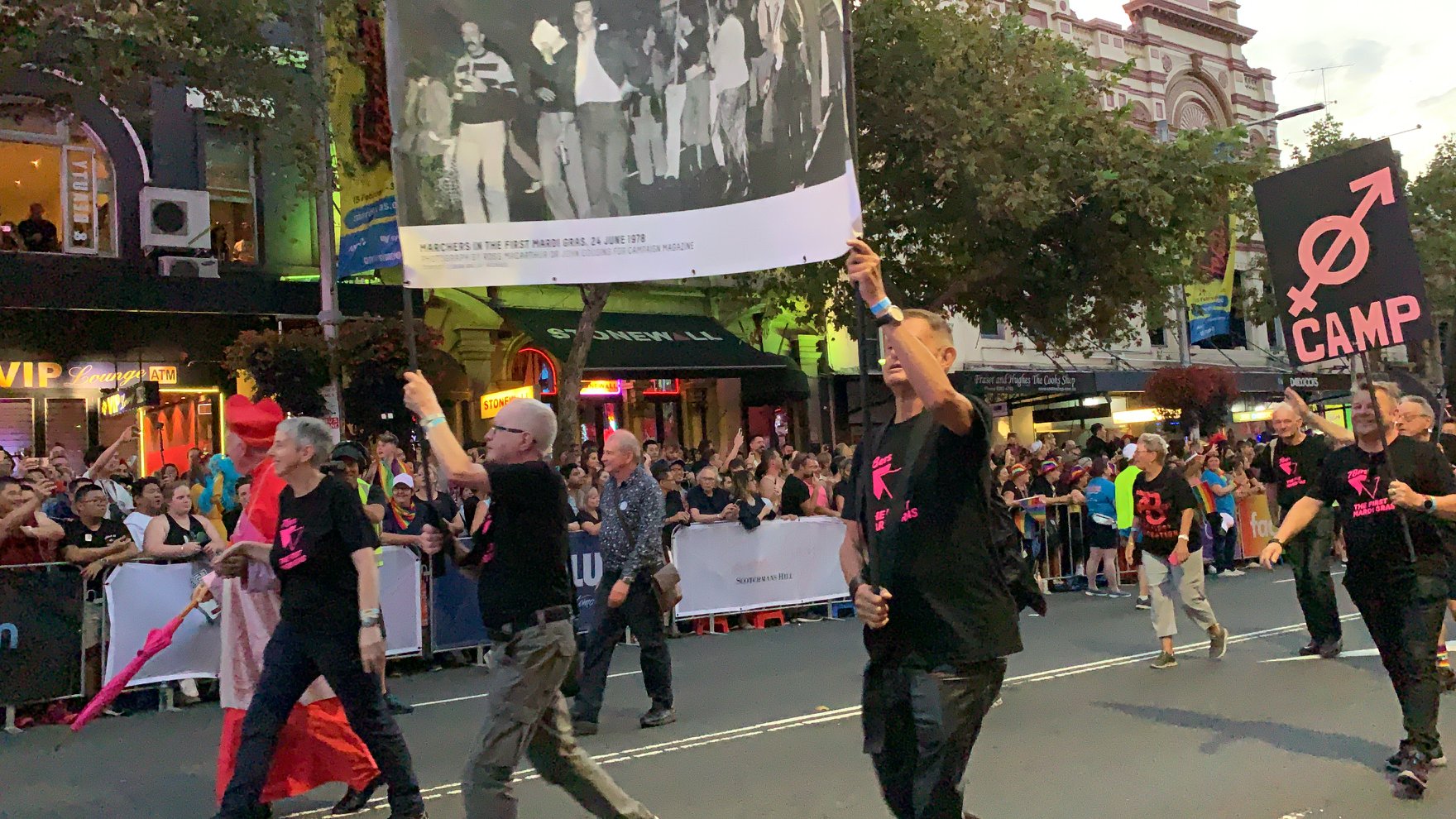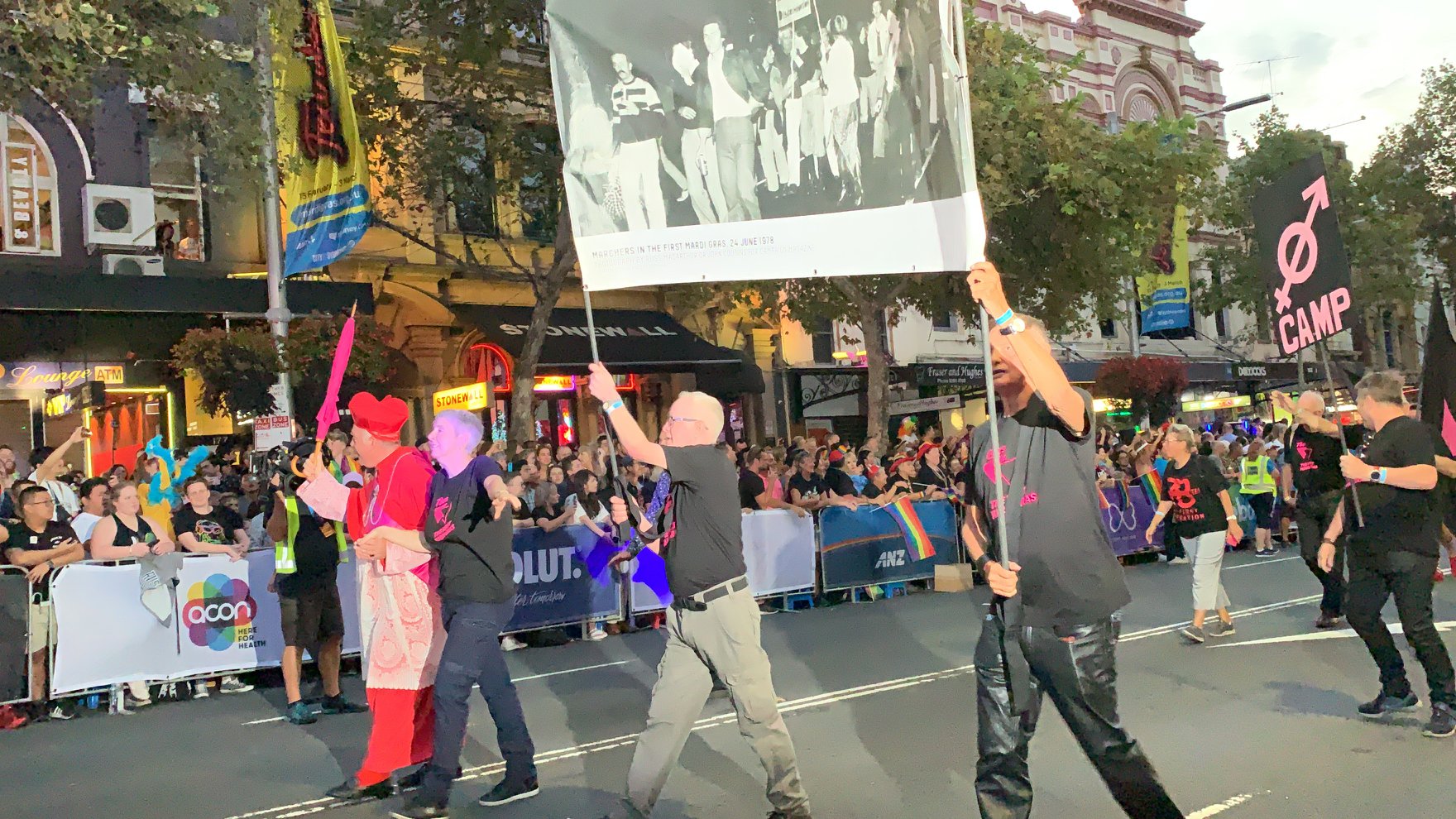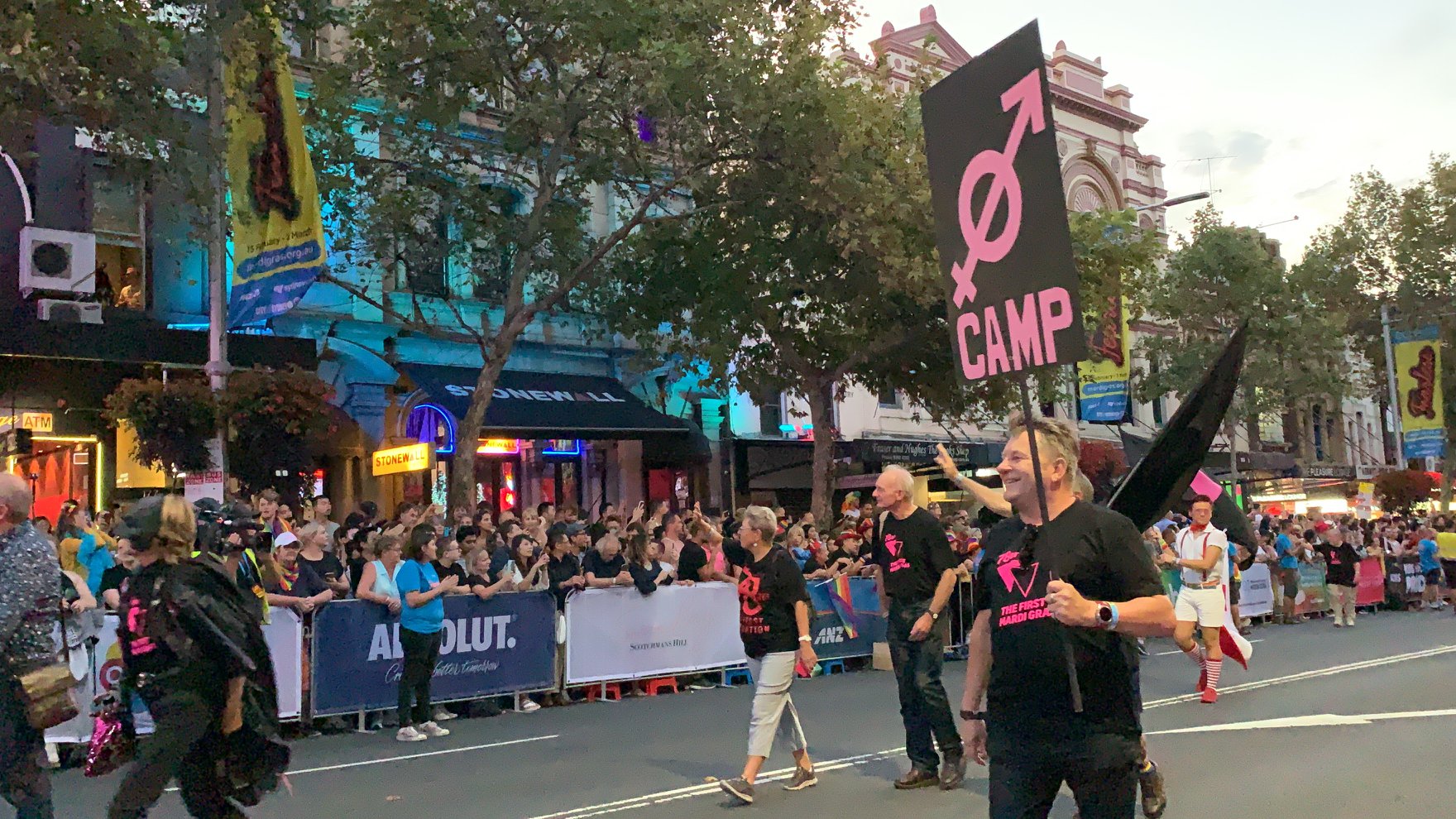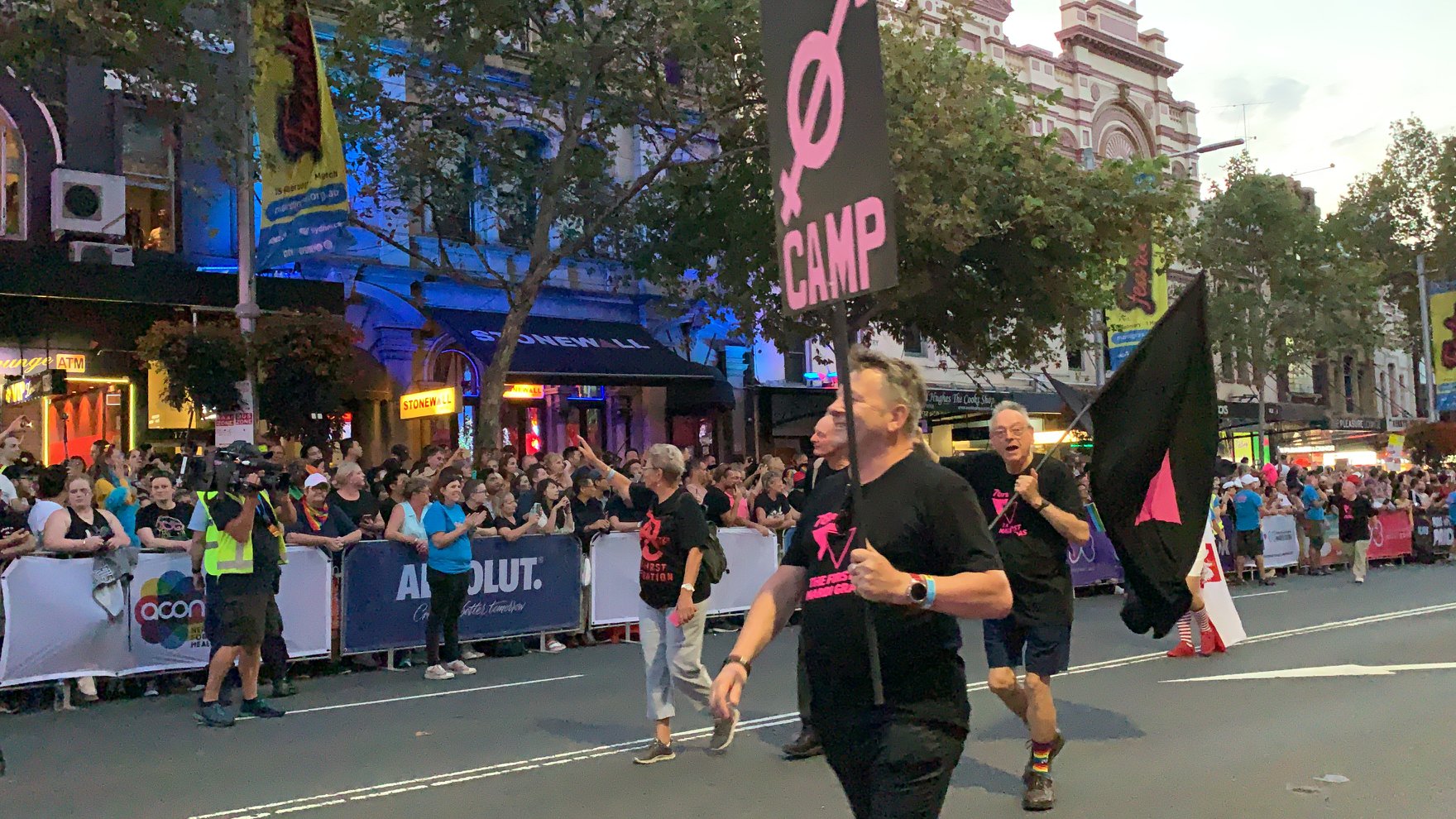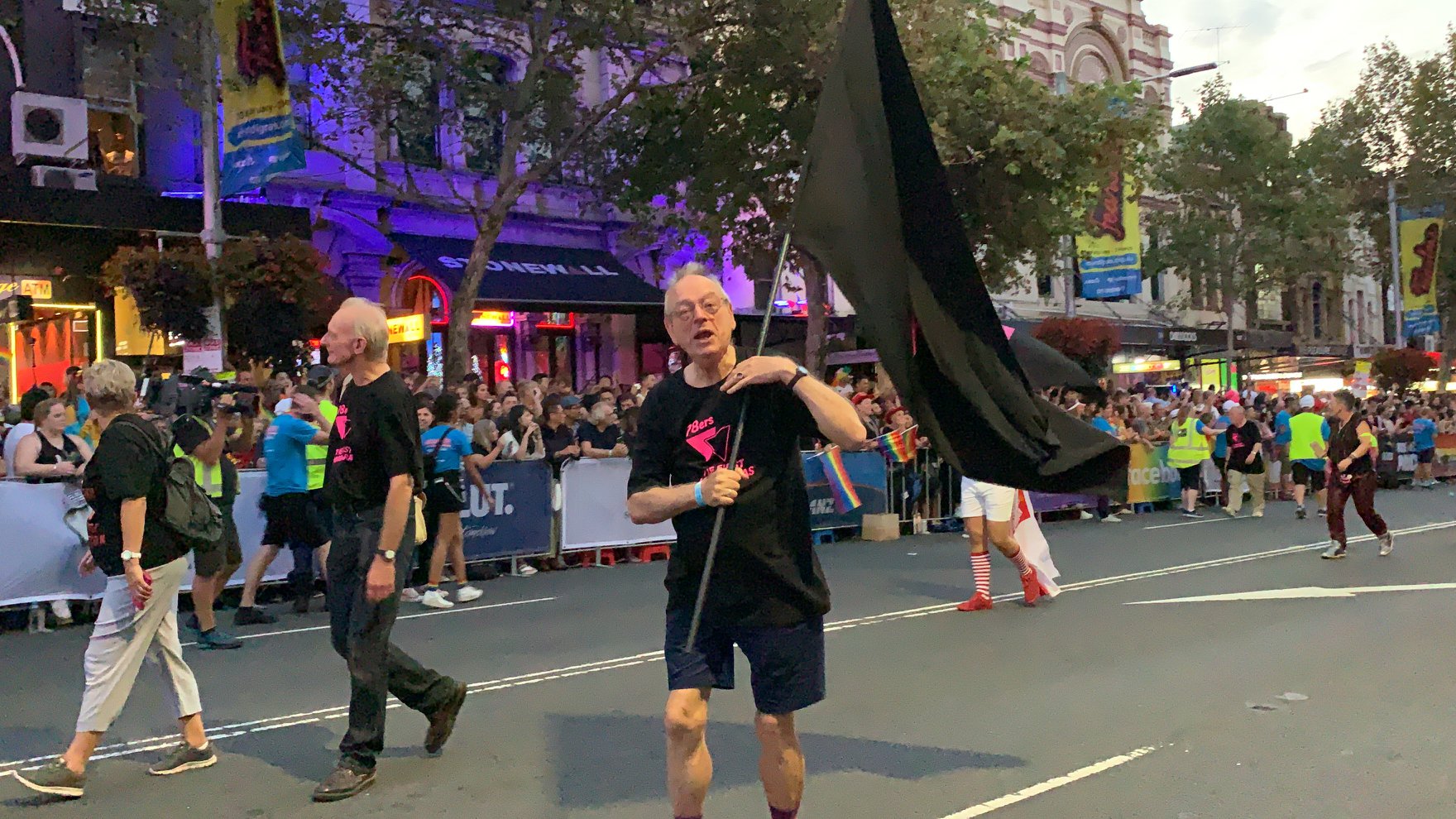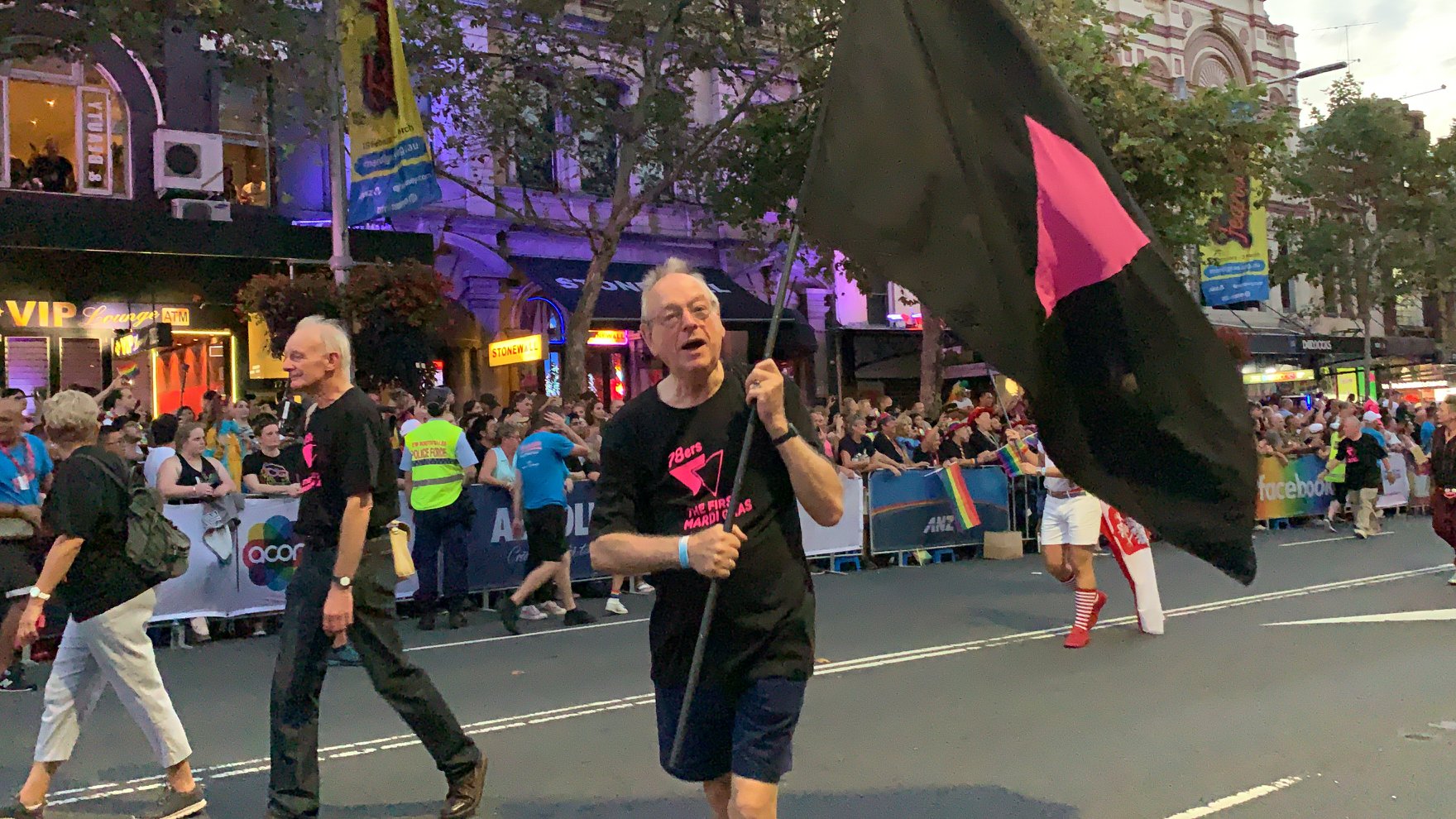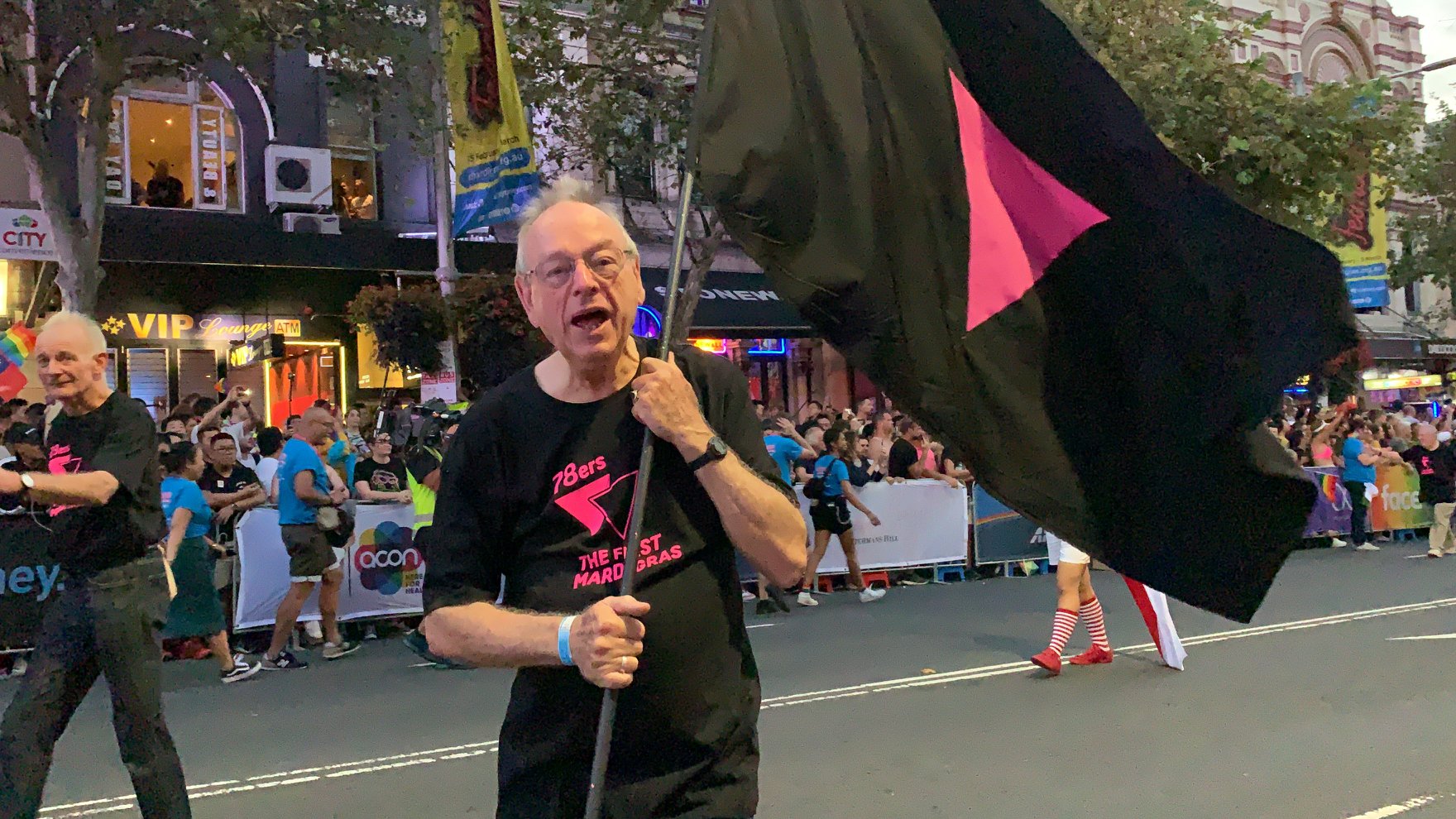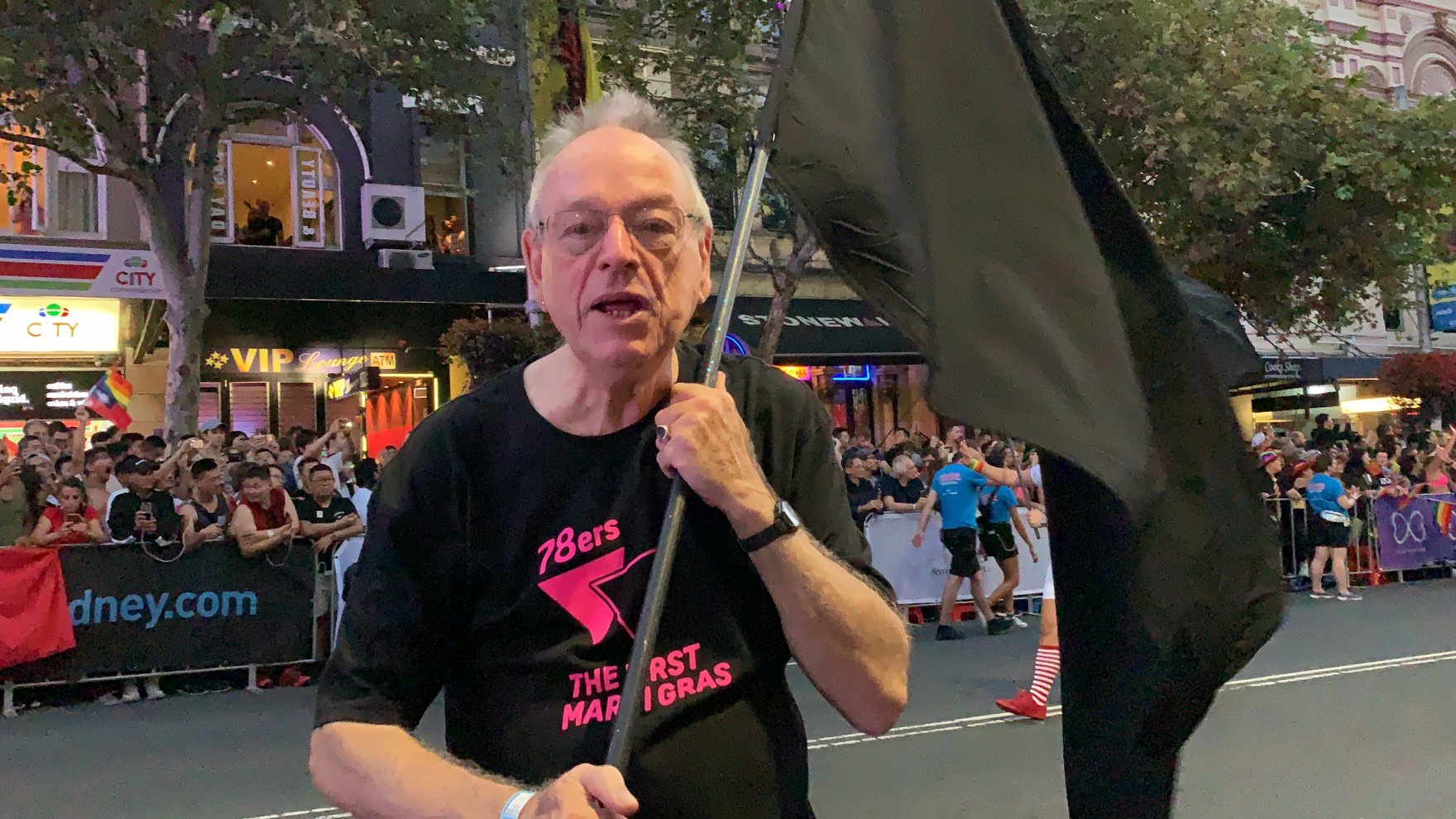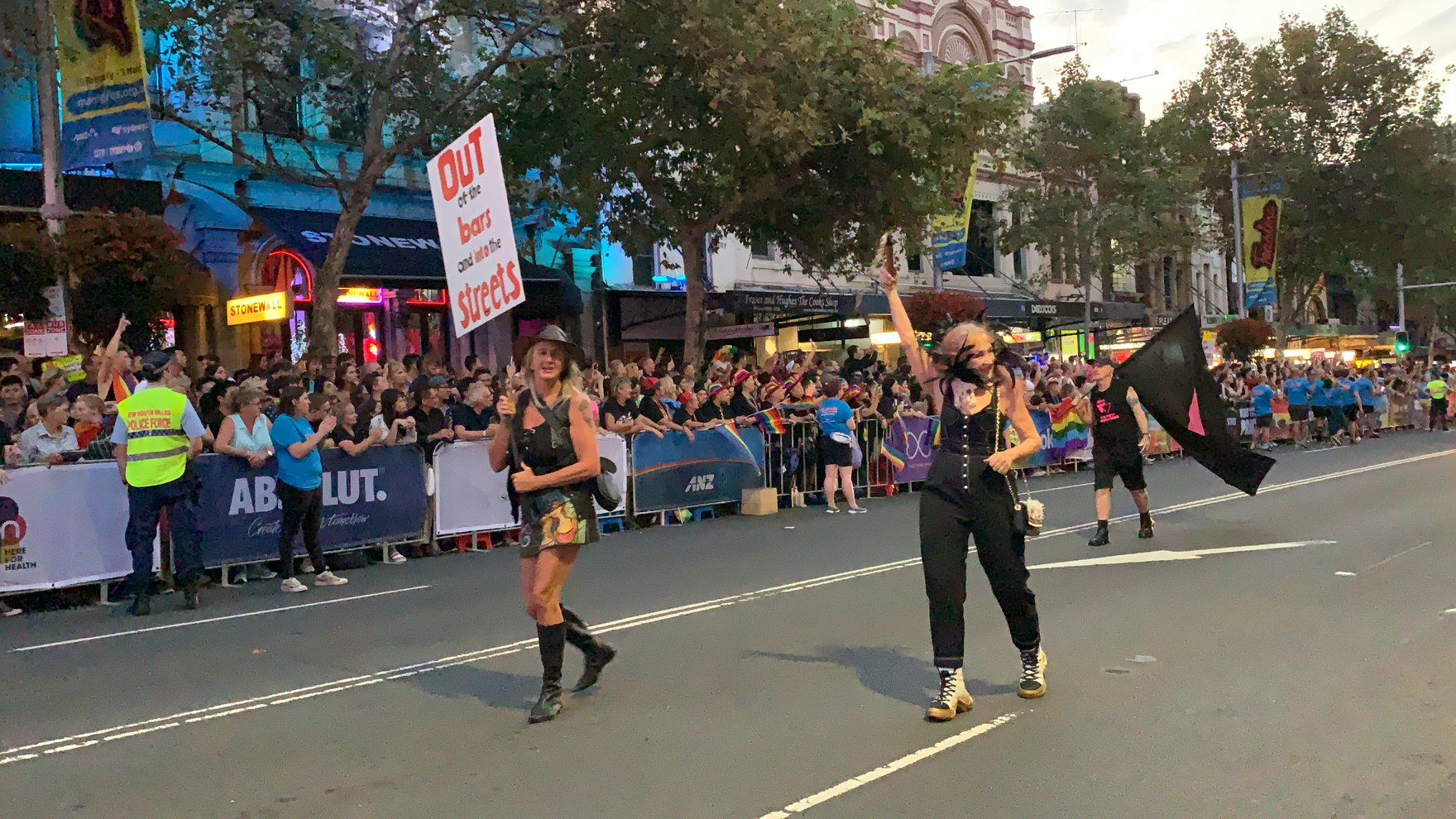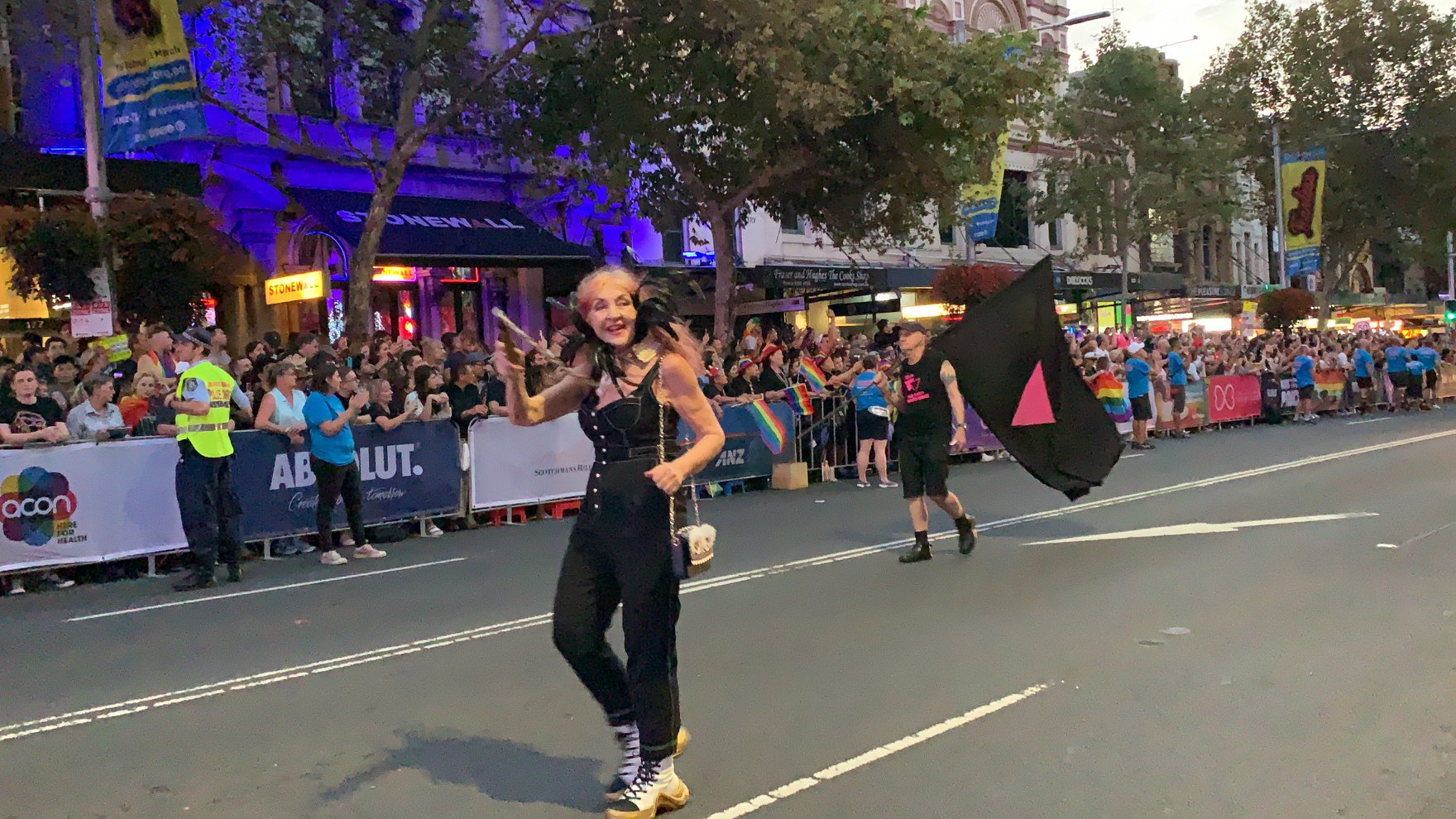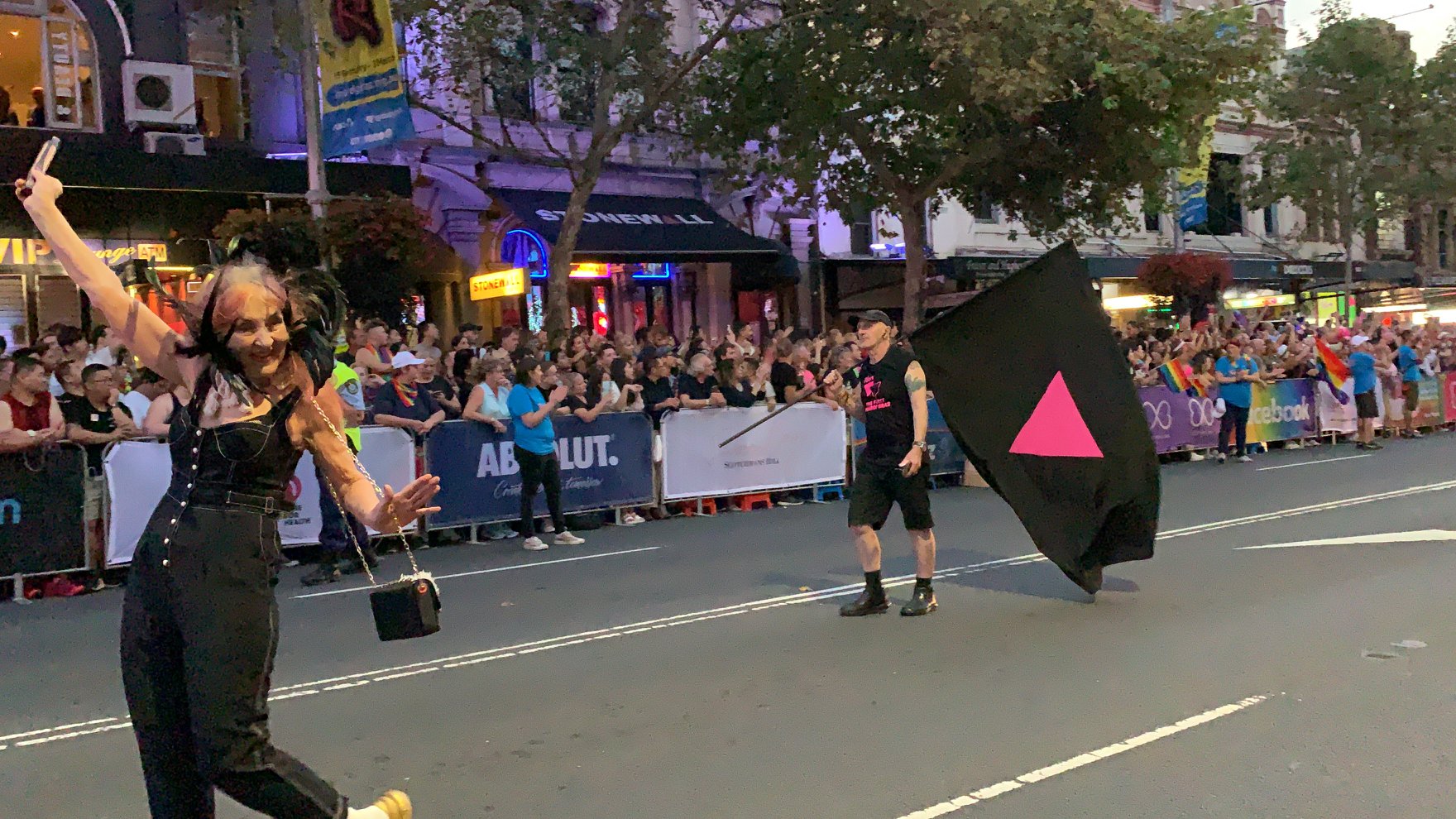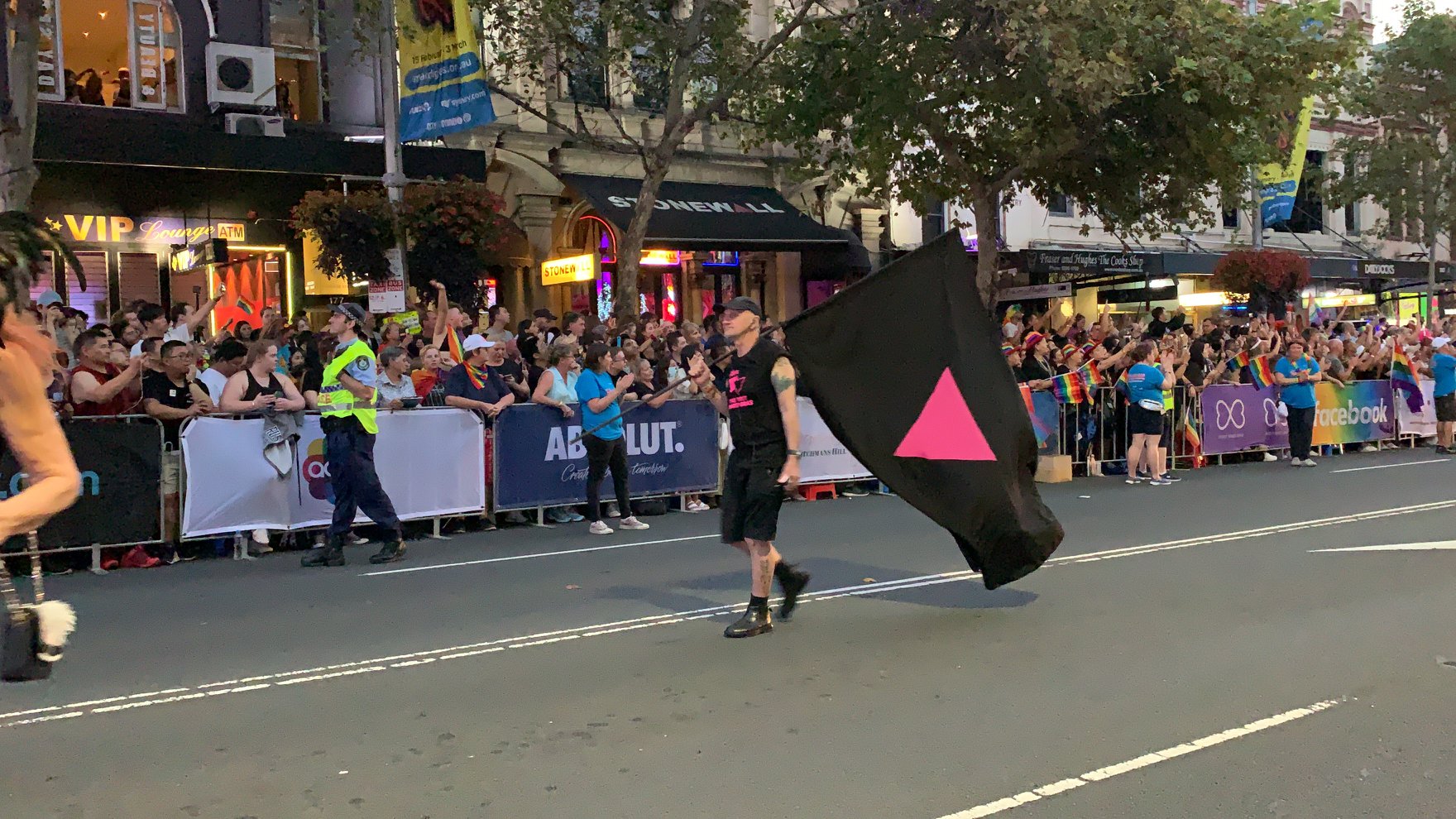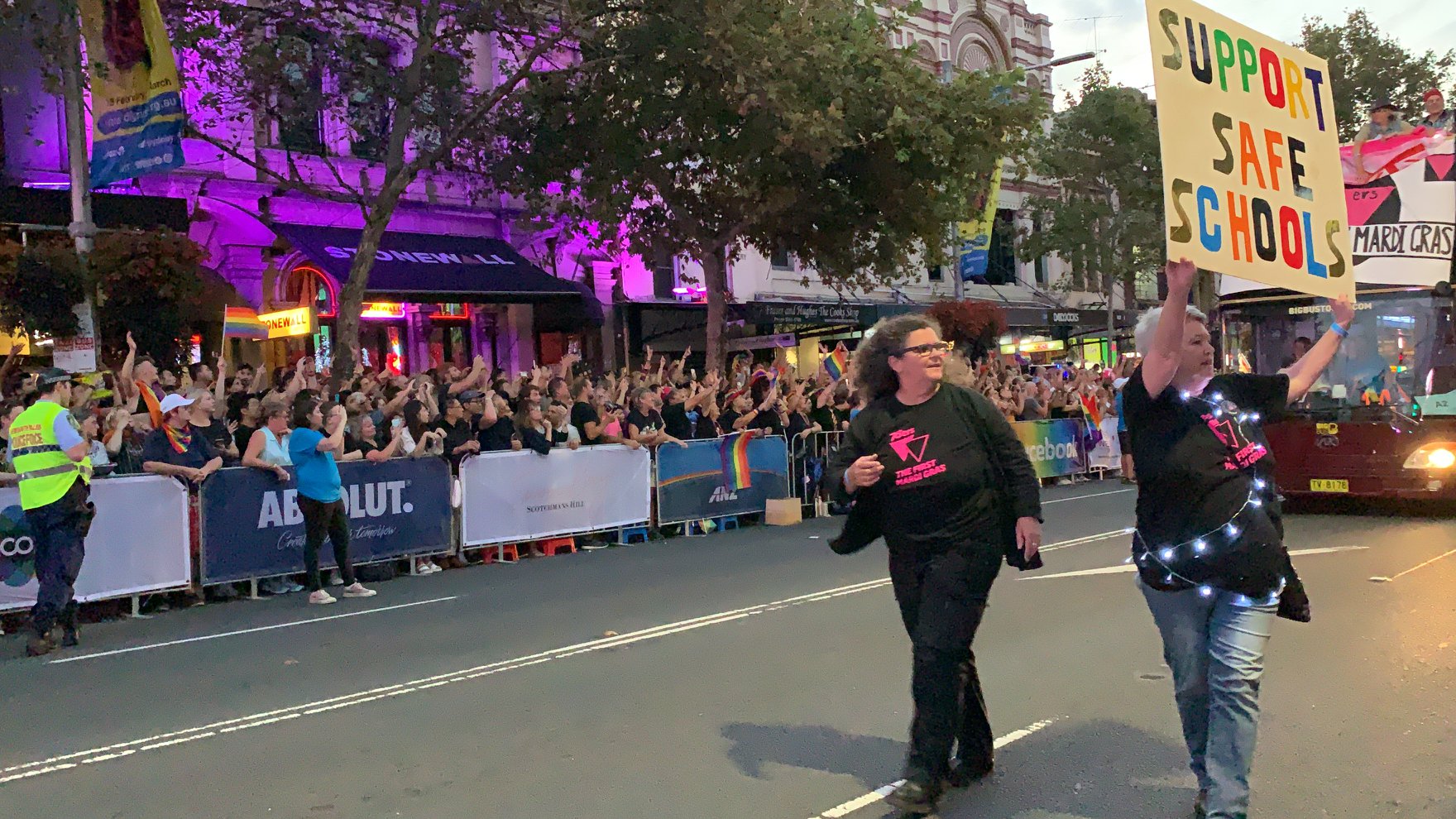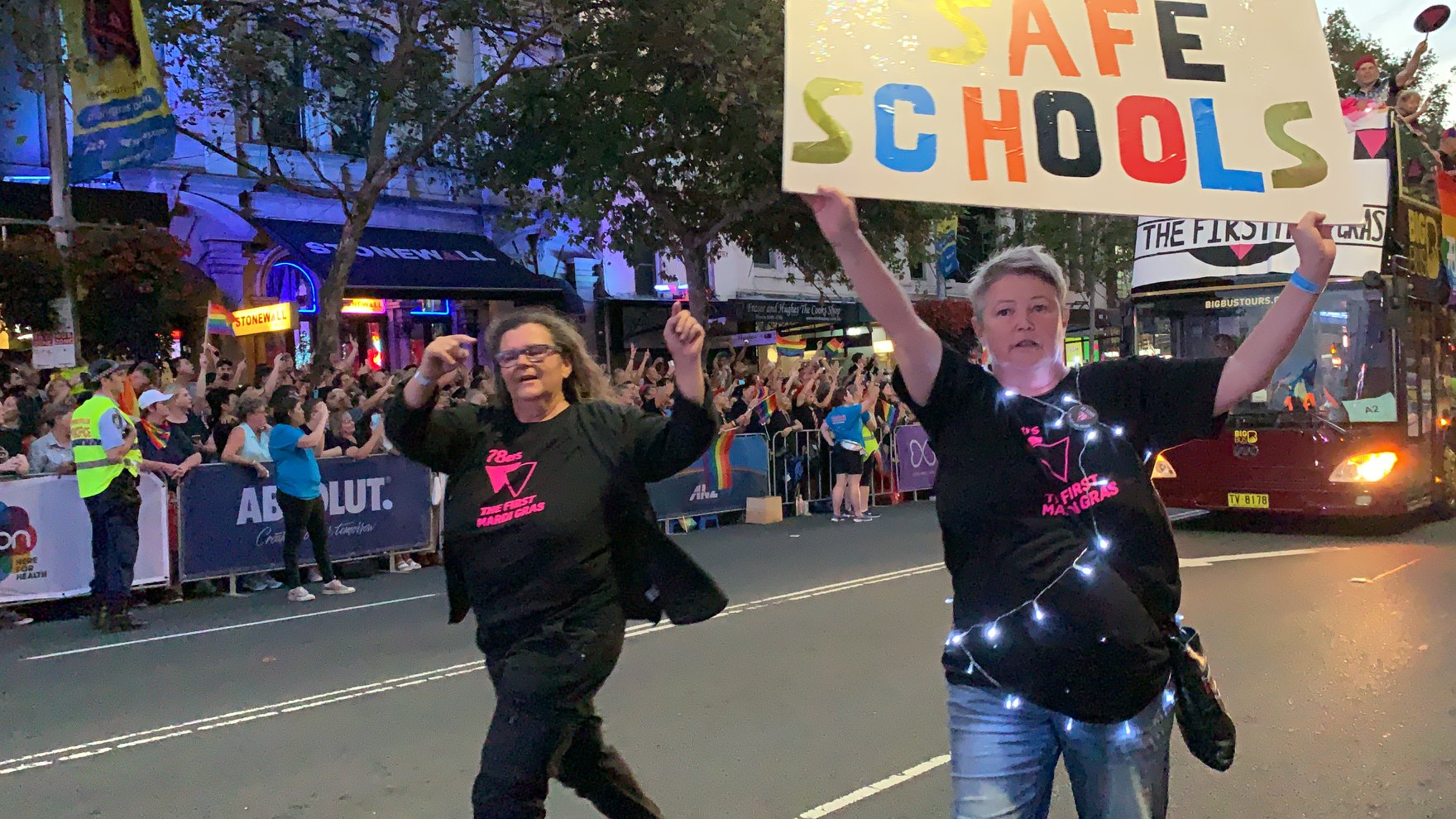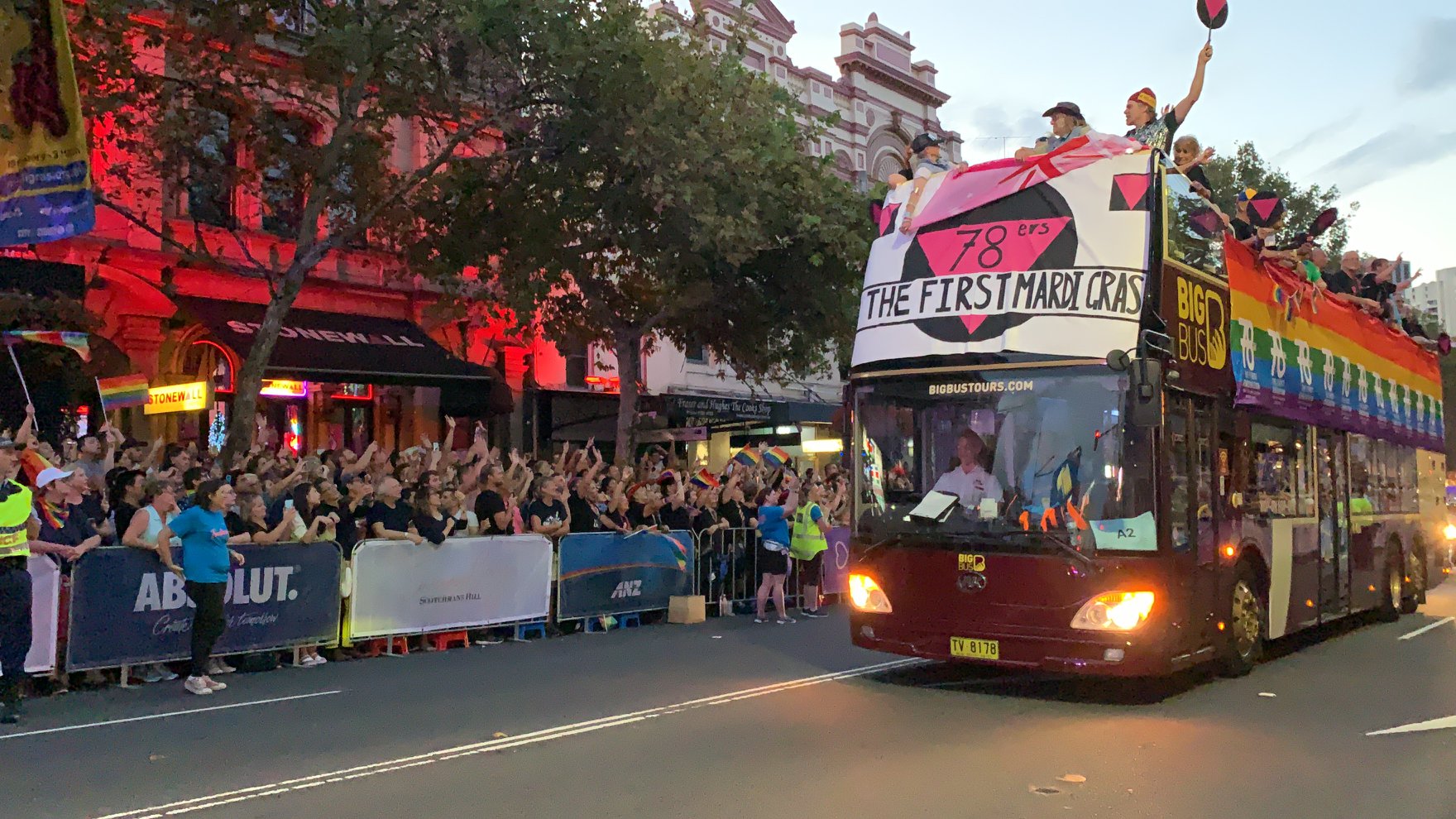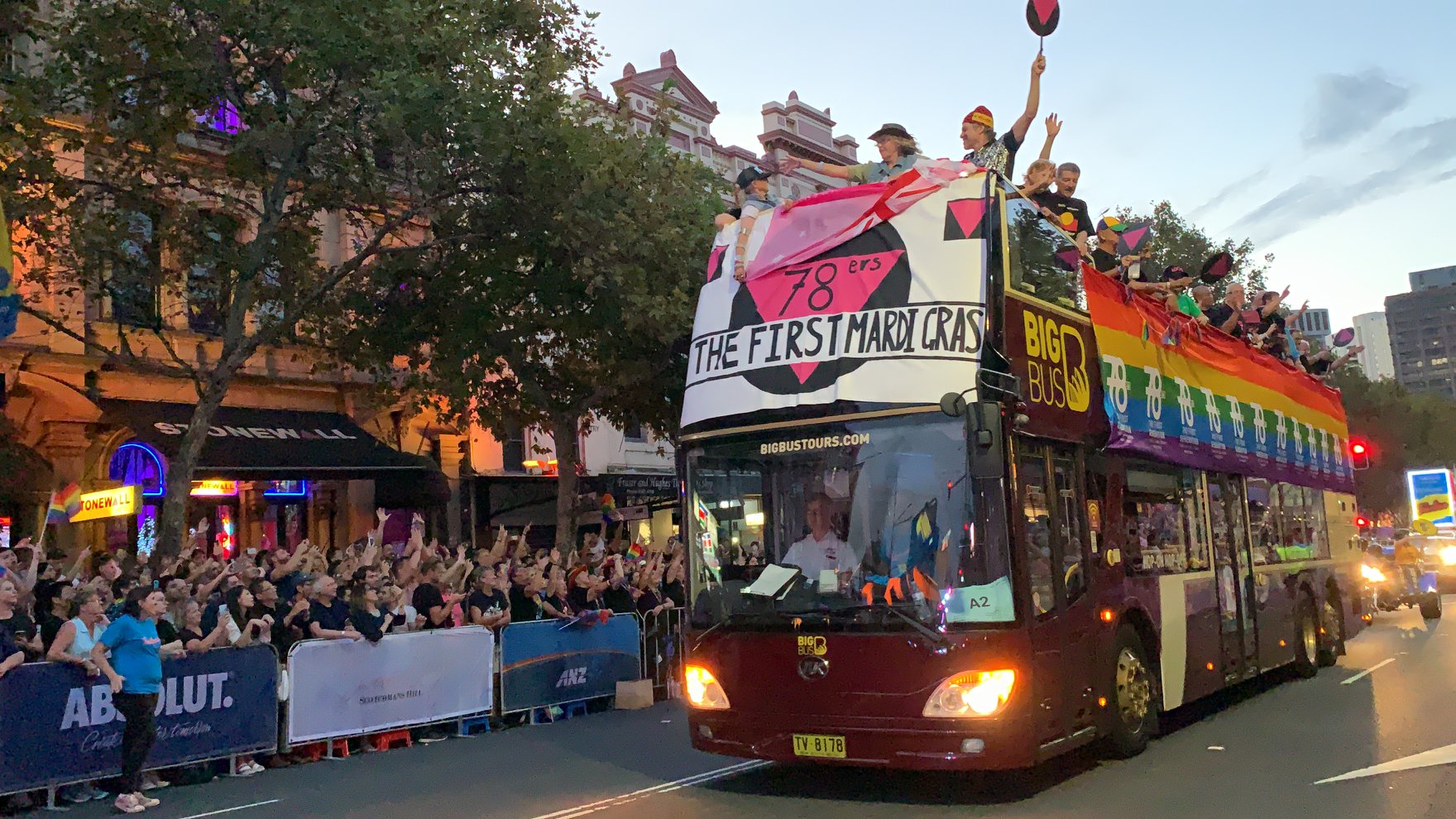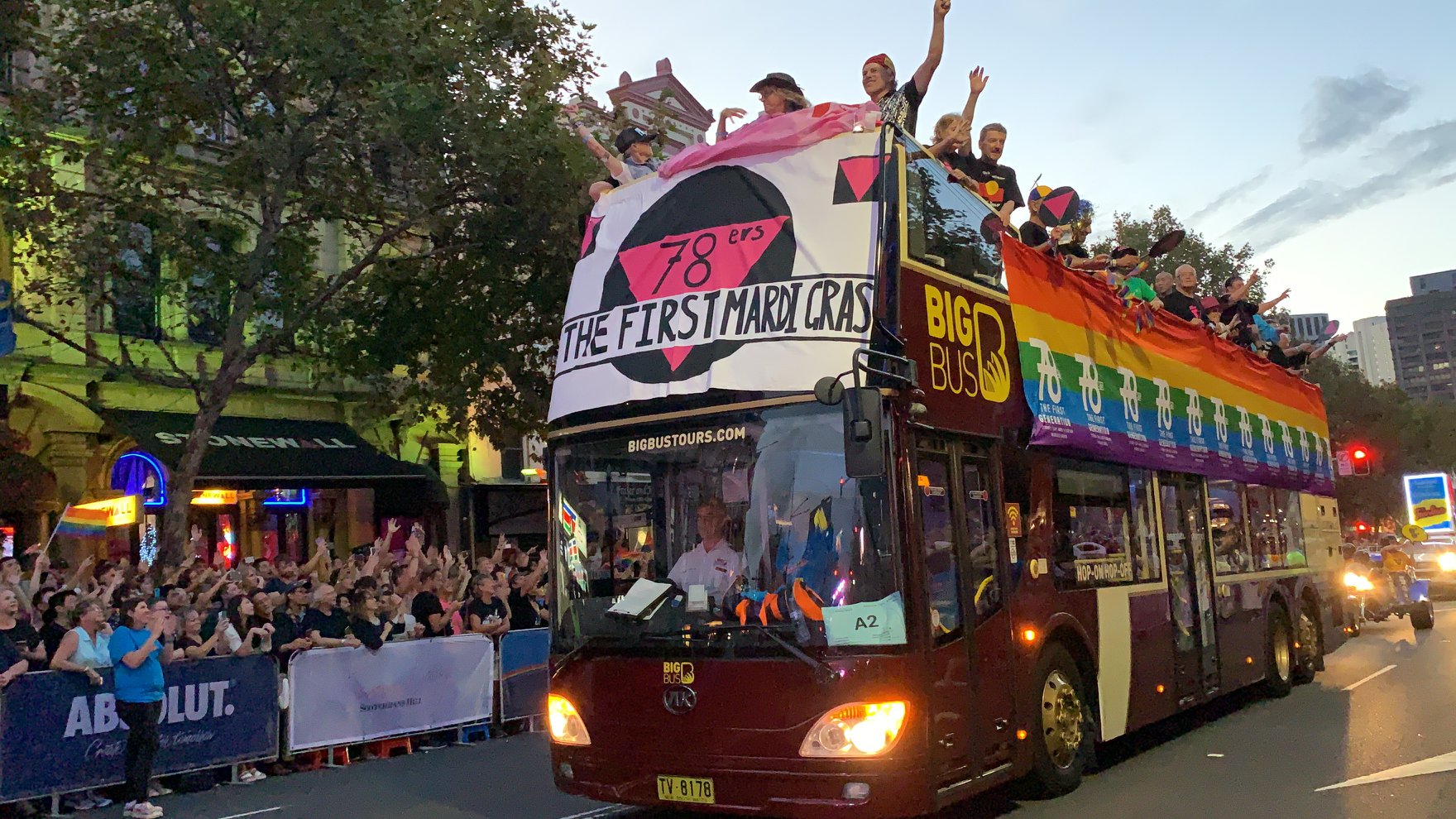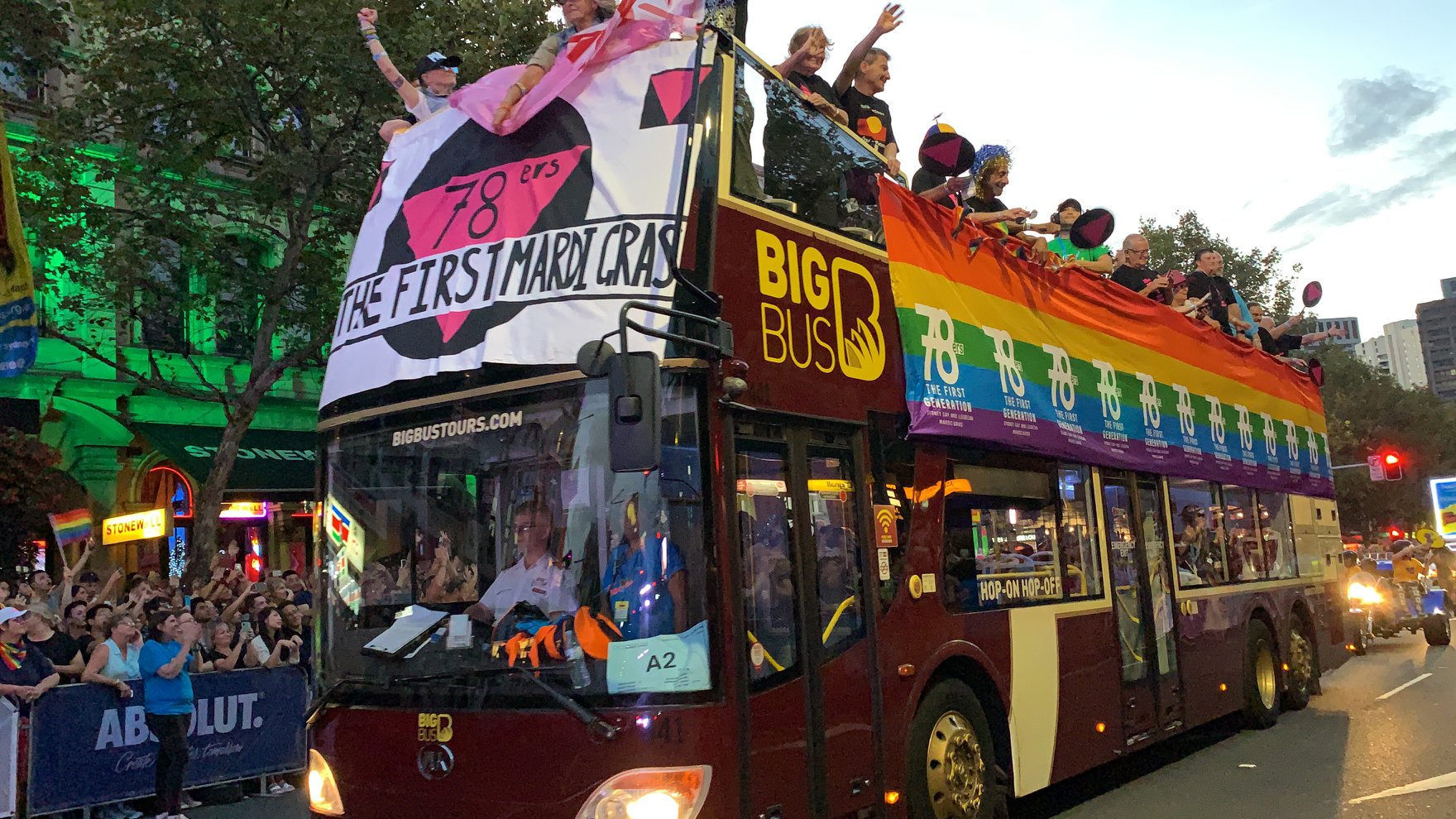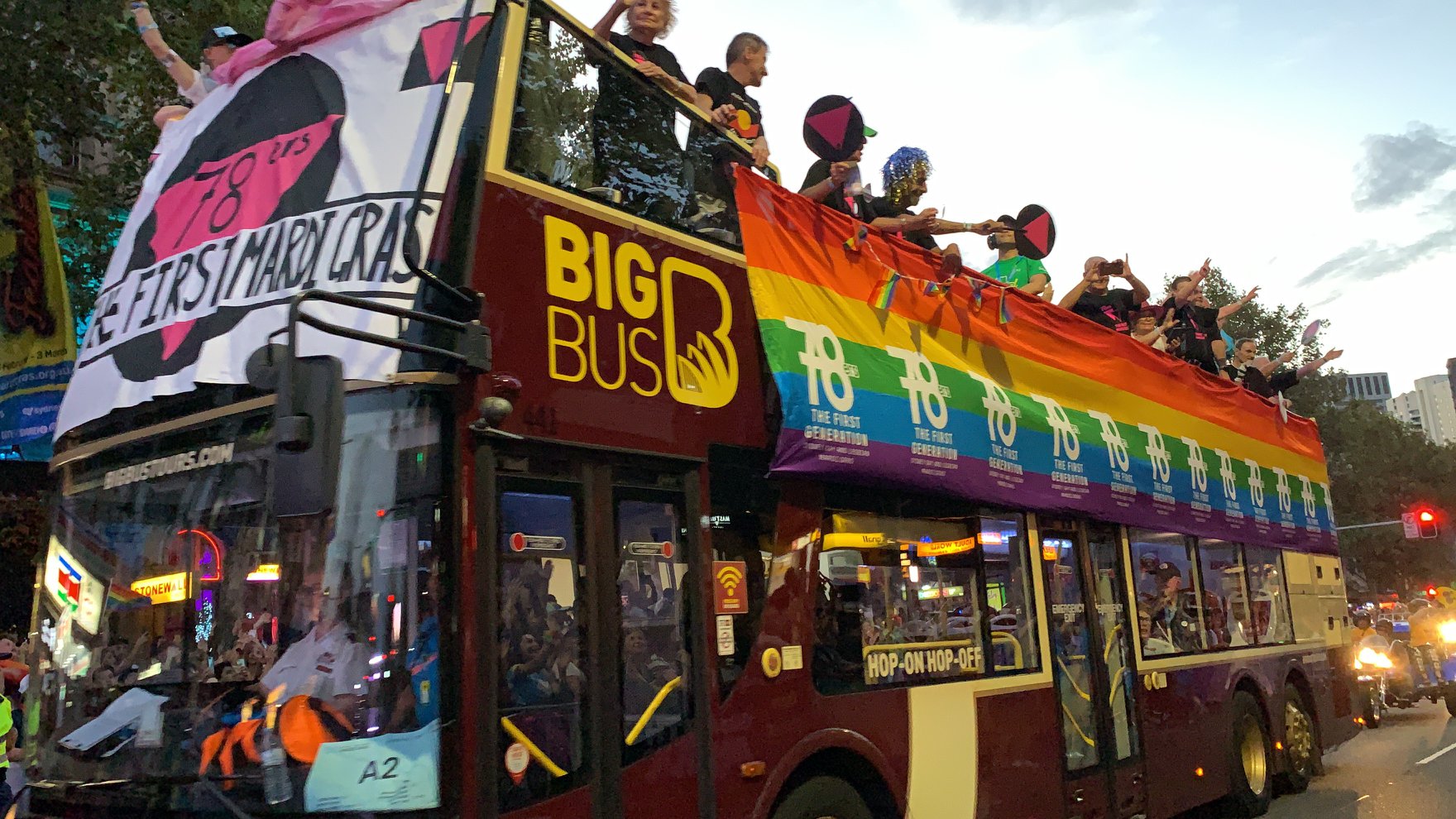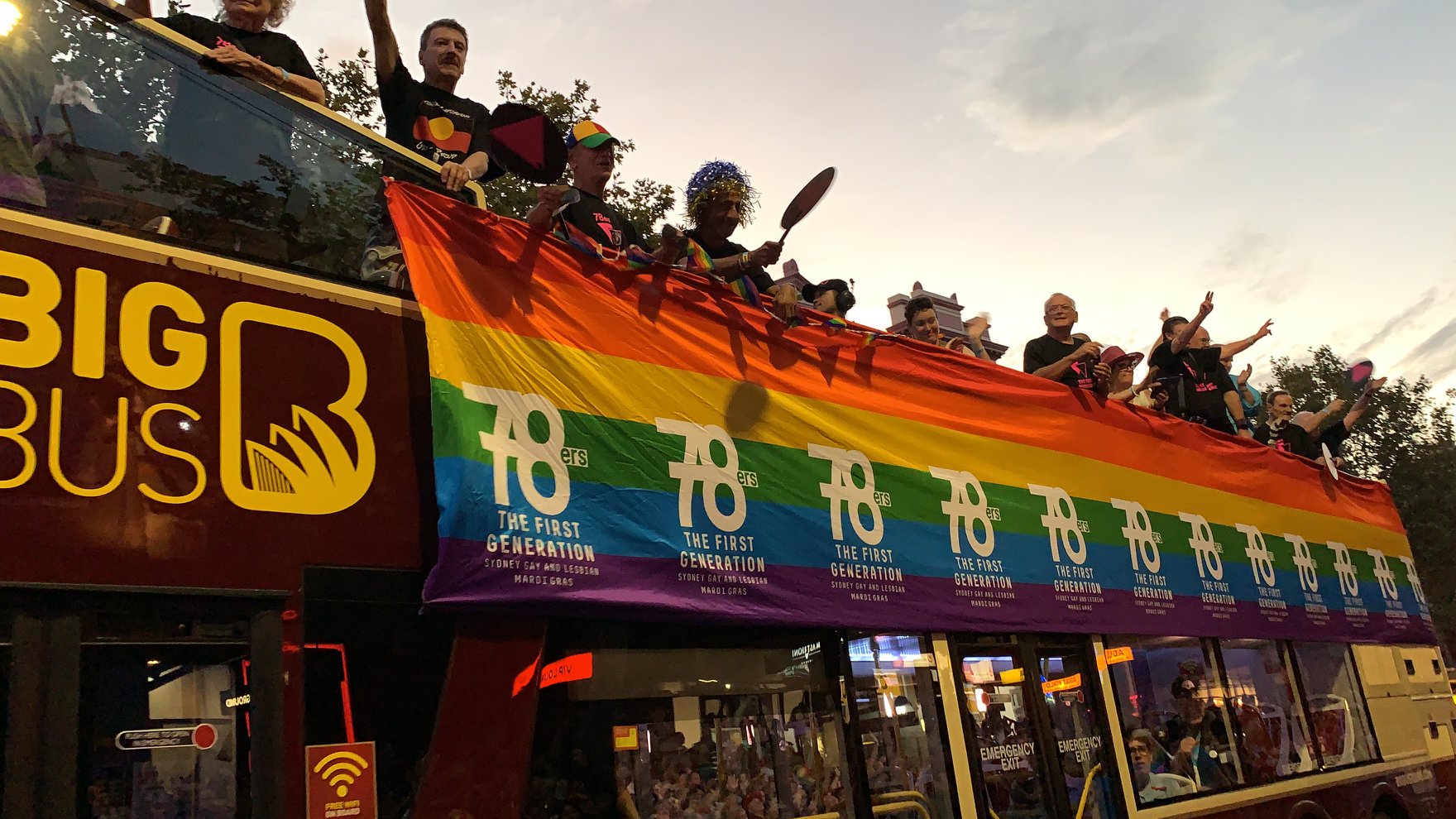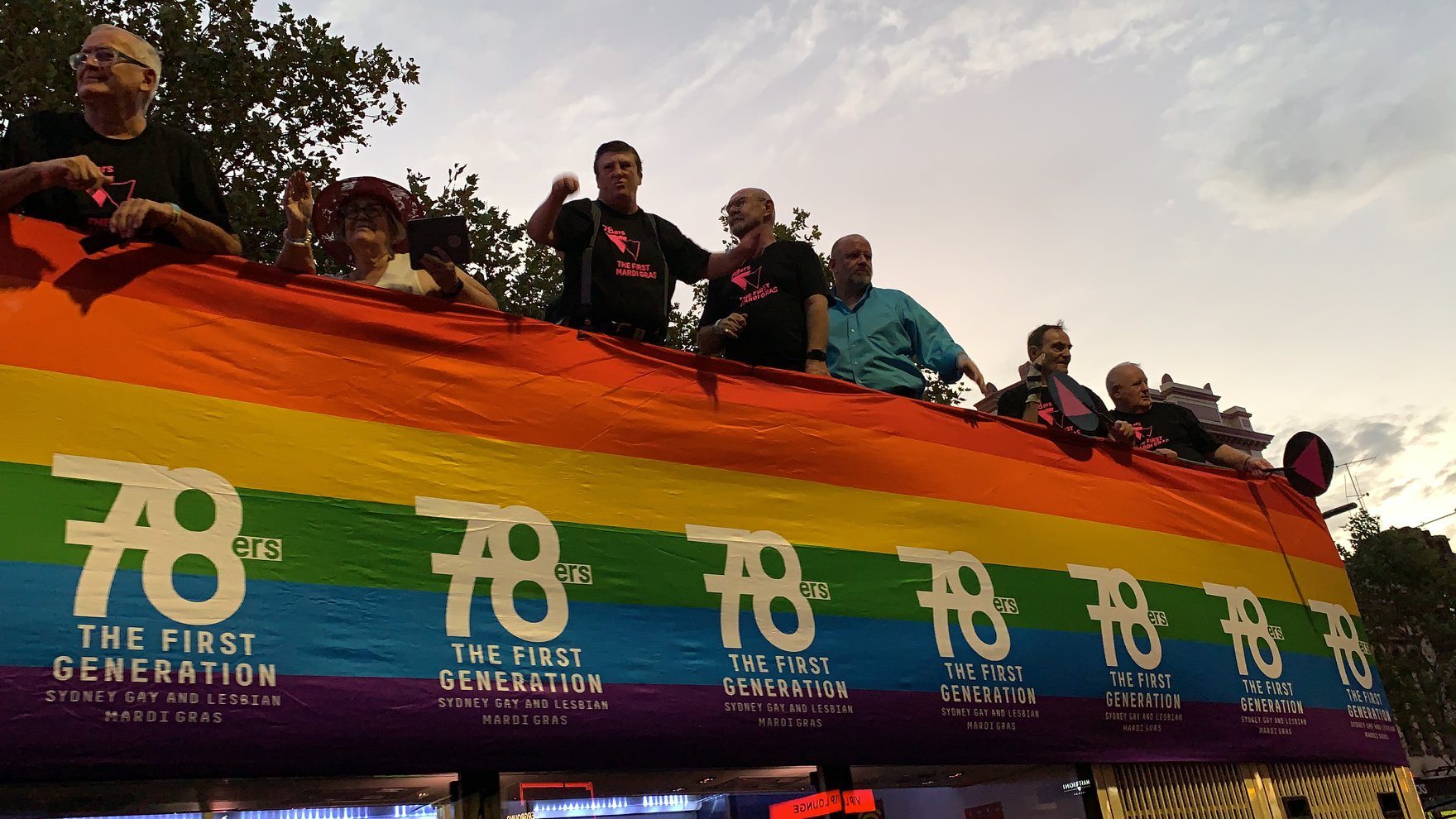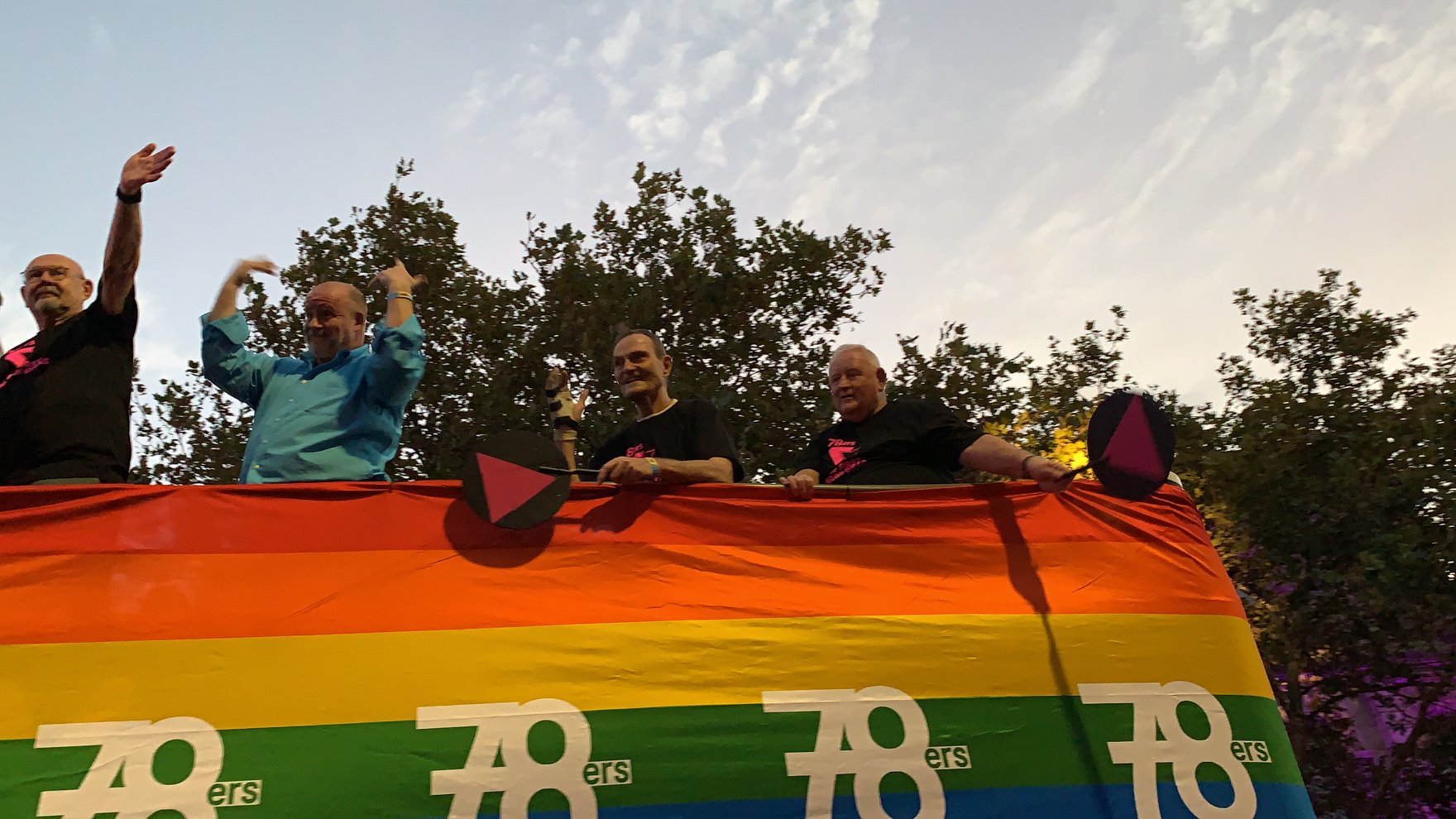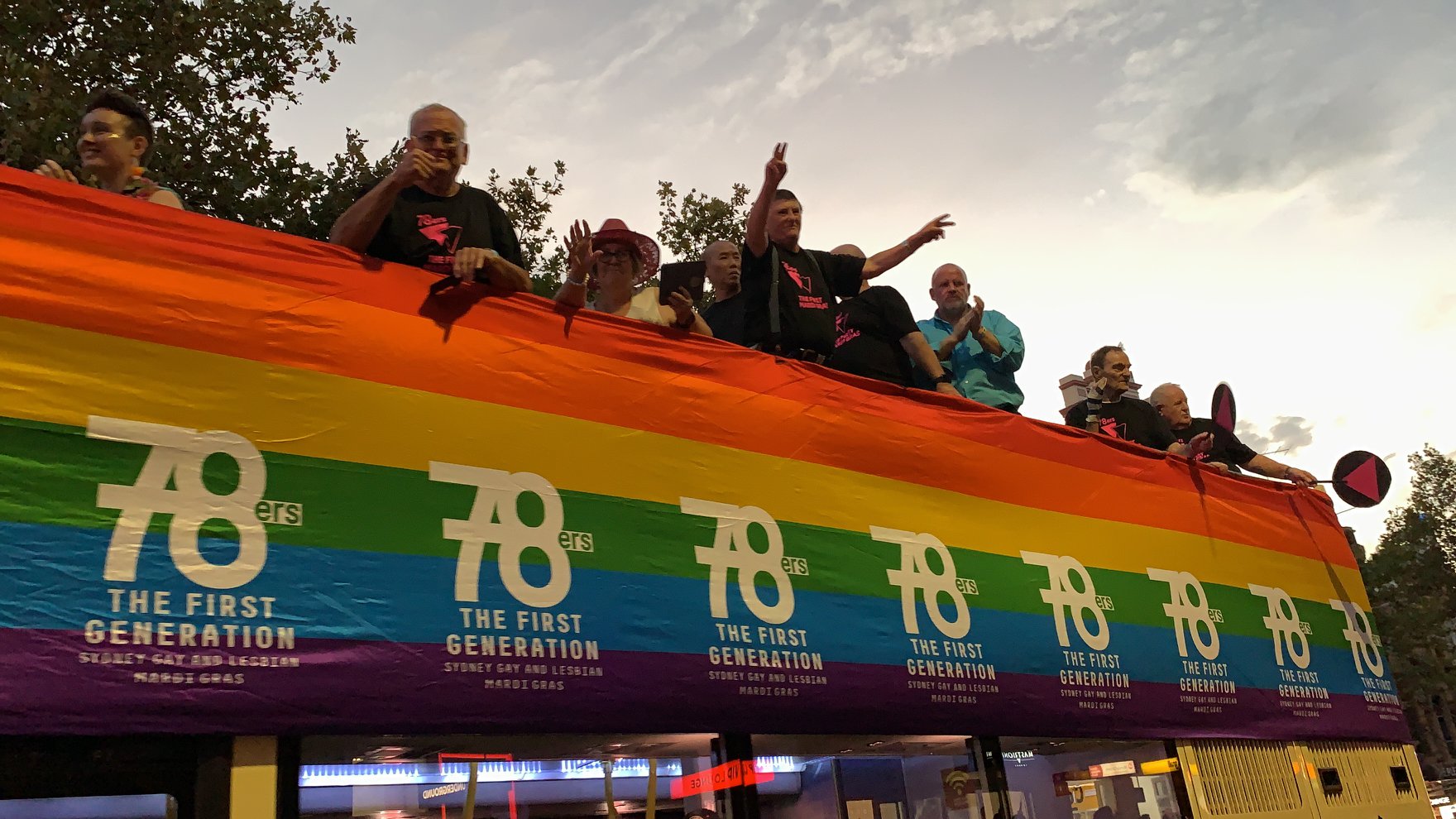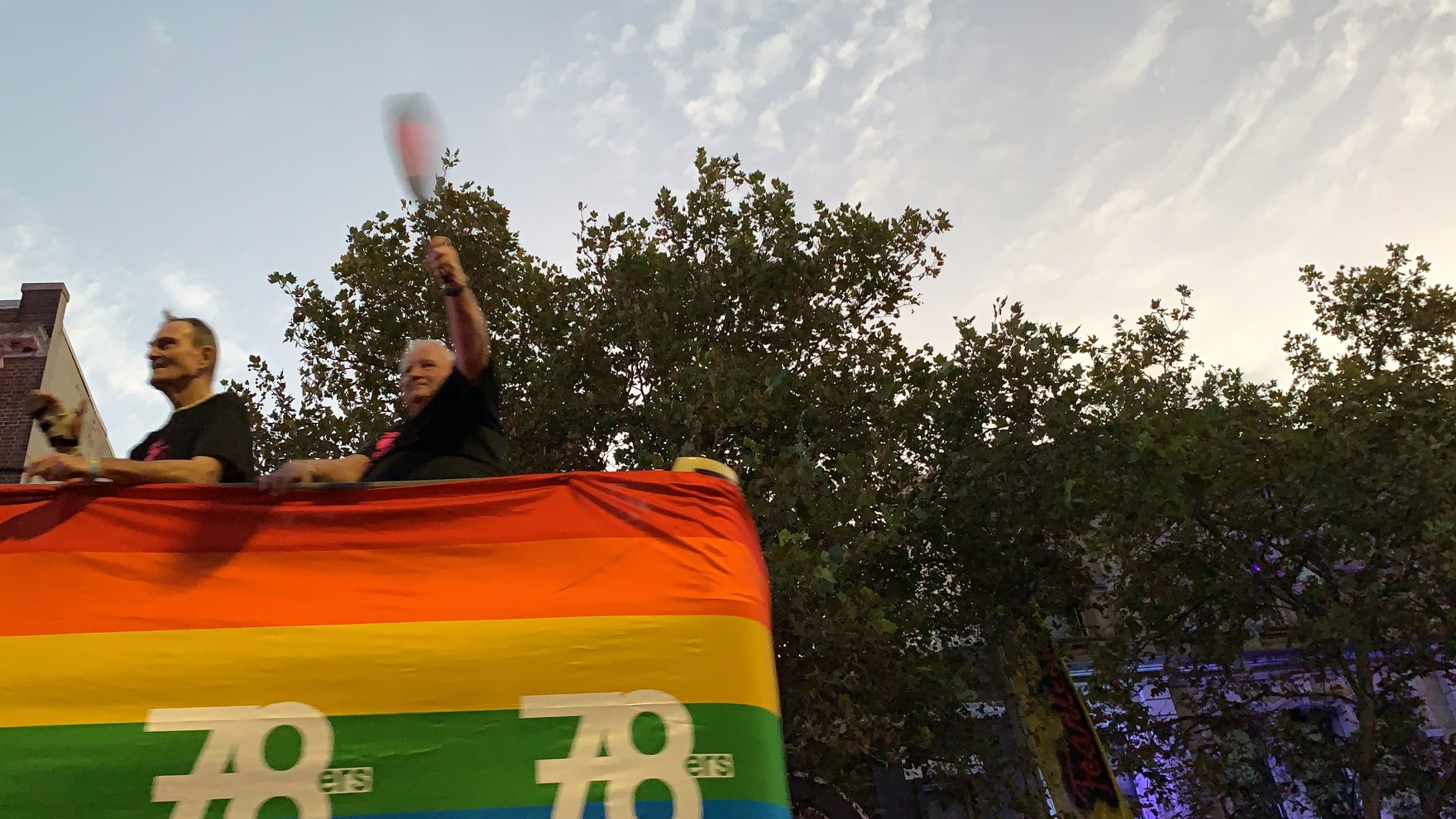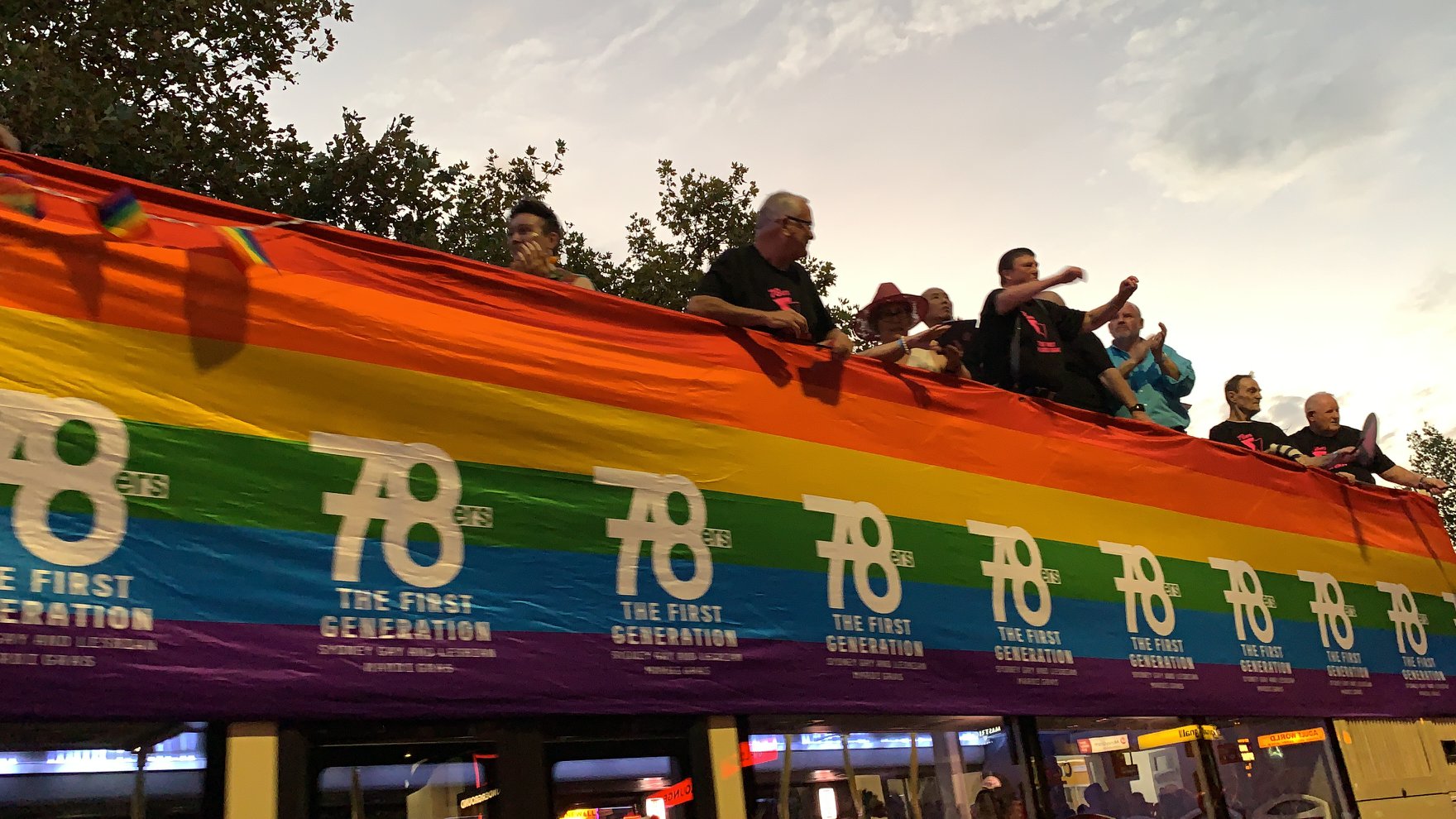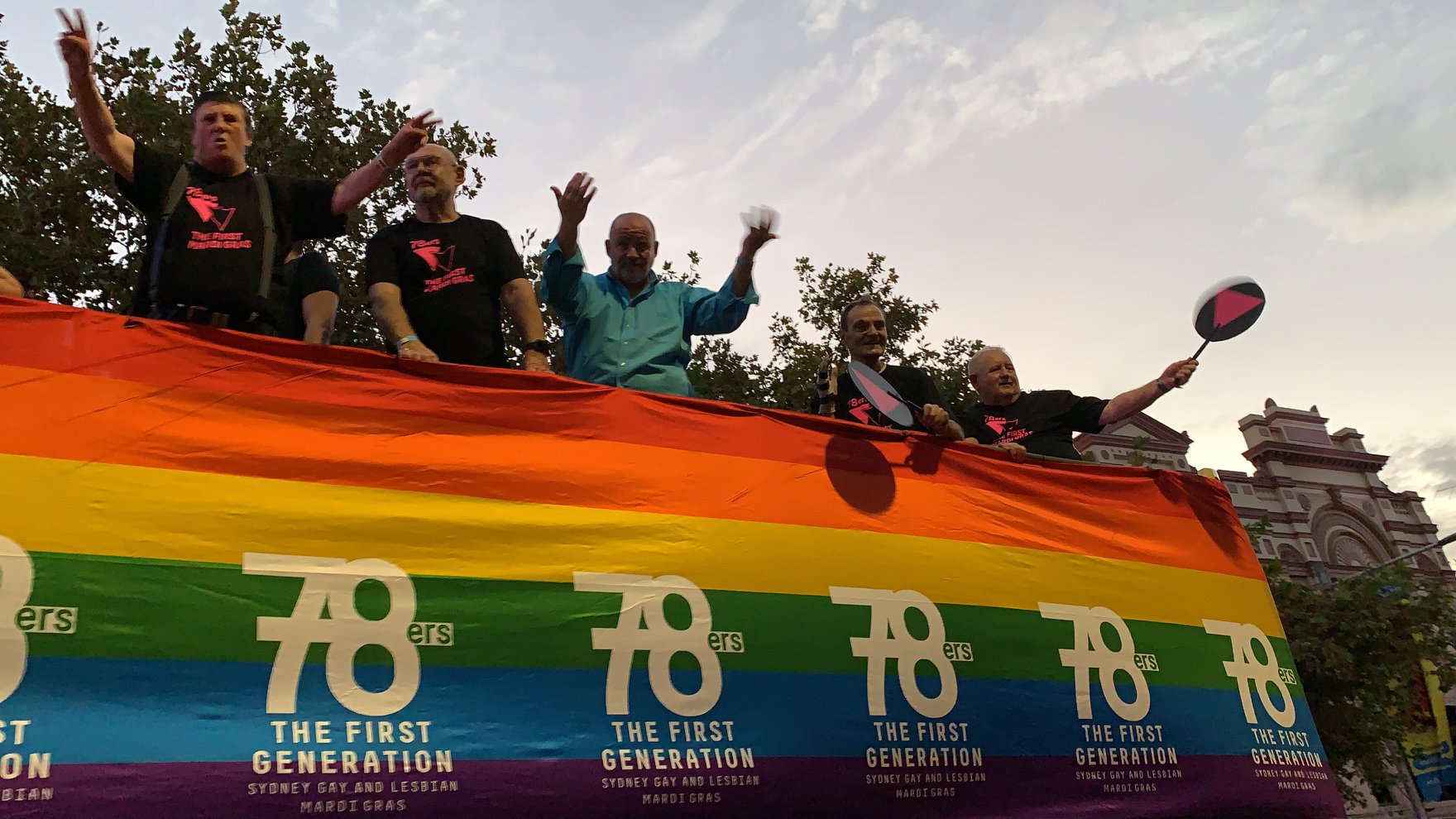In this March edition of the First Mardi Gras Inc. Newsletter, we have three articles on the 2021 Mardi Gras Parade, with one also covering the Pride in Protest march. These articles, like others in our newsletter, contain personal opinions and observations. They do not necessarily reflect the position of First Mardi Gras Inc. This newsletter includes:
- Diane Minnis on Marching into the SCG – Parade 2021
- Ken Davis on Two Parades for 44th Mardi Gras
- Karl Zlotkowski on Parade Placards – Fifty Years of Visibility
- Peter de Waal on Recognising the 50th Anniversary of CAMP Inc.
- Bob Harvey’s report on Tamworth Mardi Gras Celebrations
- Alex Greenwich, MP for Sydney: Community Recognition Statement
– The 78ers
- Karl Zlotkowski on Campaigning against Latham’s Anti-Trans Bill
- Barry Charles on plans for WorldPride Copenhagen 2021
- Diana King’s review of Why Did She Have to Tell the World?
- SUPERNOVA Movie Giveaway – In cinemas April 15
- Vale Rob Hayward 4.12.38 to 15.2.21
- How to apply for an ACON IDAHOBIT Community Grant
- Calendar of Events.
Diane Minnis
|
|
|
|
Marching into the SCG on 6 March 2021 was an amazing buzz. The atmosphere was electric! It was certainly different to parading up Oxford Street, but so special celebrating an unbroken line of 44 Mardi Gras Parades.
The day began at 7.30am for a group of 20 of us: mainly 78ers with a few partners and friends. We assembled on Wentworth Avenue in the city to be filmed as part of a Parade opening sequence. There were six Dykes on Bikes, a First Nations bus and a 78ers bus. The footage was shown at the SCG in the lead up to the Parade entering the arena – where large vehicles were not allowed.
When we marched in to the SCG, the 78ers contingent was greeted by an excited crowd who stood and clapped and cheered as we reached each section. Electronic signs all around the ground flashed in pink and black “Forever Grateful to Our 78ers – the first Mardi Gras”. Many of us were very touched by this.
There were 51 78ers, partners and friends in our contingent and seven of the group rode on a buggy. We carried placards celebrating Fifty Years of LGBTIQ+ Visibility, highlighting key events and people from 1969, 1970 and 1971.
Fifty Years of Visibility
The SGLMG 78ers Committee had prepared a detailed media brief on Fifty Years of LGBTIQ+ Visibility. The brief included key messages on the first Australian activist LGBTIQ+ organisations founded 1969-70 – Australasian Lesbian Movement (ALM), ACT Homosexual Law Reform Society (HLRS) and Campaign Against Moral Persecution (CAMP Inc.). Also covered were key members of ALM and CAMP Inc. who “came out” on TV and in the press in 1970.
We were thrilled to hear our key messages of Fifty Years of LGBTIQ+ Visibility read out by 78er Julie McCrossin as we marched around the SCG.
Each contingent was invited to accompany our entry into the stadium with appropriate music. We chose parts of Glad to be Gay by the Tom Robinson Band (in homage to June 1978) and a much loved classic anthem of 1970….You Don't Own Me! by Dusty Springfield.
The Parade
After marching around the ground we went to seating reserved for 78ers. Some 78ers had gone straight to their seats in the stands and did not march. We had a terrific view of the rest of the Parade which was meticulously organised with the COVID-safe, smaller than usual contingents marching out of two entrances, then around the ground and up a central path past the TV cameras.
We appreciated the pink triangle shaped stages on which the various artists performed. The use of electronic signage and lighting around the ground, and the entertainment that followed the Parade – even though the sound was at times sub-par.
Community floats were numerous and colourful, with Rainbow Families making a big splash, and there were workers groups and political parties featured.
There was not much humour and satire aside from Ethel Yarwood’s contingent which covered corruption and pork barrelling in NSW. (Though I think it is racist and sexist to satirise Gladys Berejiklian’s name as bin chicken.)
The sponsor floats were toned down this year as they could not use vehicles and most used pushables and flags or placards.
One sponsor, law firm MinterEllison, even had clever political commentary. Their contingent dressed as the late US Justice Ruth Bader Ginsberg and carried letters spelling out “All Rise” – a term used in courts and a reference to the Mardi Gras theme of “Rise”. (Though in the week after the Parade they sacked their female CEO for objecting to the firm representing Christian Porter.)
SGLMG, please consider the actions and ethics of sponsors for our great event and the continuation of the Mardi Gras Parade and Festival into the future.
What Next?
Speaking of the future, a number of 78ers have commented positively on the event at the SCG: a great view of the Parade; the comfort of seating; access to toilets, food and drink; and the lighting and electronic signage available in a stadium.
However, a lot of 78ers are keen to get back to the streets where our Mardi Gras began – to be out there with people able to see our Parade and our message – unfiltered by TV coverage, editing and production.
Some, though, are keen on a hybrid event – part street march with a finish in the SCG and marchers going to the seating afterwards. Former SGMG President Murray McLaughlin suggested this in the 1990s and was roundly condemned. But maybe it’s time to revisit a combined street and stadium Parade!
Diane Minnis
78er and First Mardi Gras Inc. Co-Chair
|
|
The sixth of March 2021 was a bit like 24 June 1978, with a militant daytime street march, and a larger night-time parade, but a lot has changed over four decades. And the Coronavirus has made a deep impact.
Pride in Protest (PiP) March
Pride in Protest (PiP) organised a “Take Over Oxford Street March” with intersectional demands around transgender rights, queer refugees, police, decriminalising sex work and drug use, Black Lives Matter, opposition to One Nation MLC Mark Latham’s Parental Rights Bill and to the federal “religious freedom” Bill. They claimed a crowd of 3,000 in “a mardi gras with no cops, no corporations, no conservatives”.
In the week before the rally, organisers had taken police to court to overturn a ban on this gathering of more than 500. NSW MPs Jo Haylen (Labor), Alex Greenwich (Independent), and Jenny Leong (Greens), wrote support letters. On Friday, NSW Health granted an exemption for the Saturday rally. The march was opposed by SGLMG and the advisory elected committee of 78ers.
The crowd was mainly young, many in fancy dress and most in masks. The police presence was strong, and police were very restrictive, with Taylor Square partially closed. There was a moving acknowledgement of Country by Aunty Rhoda. Charlie Murphy, one of the two PiP activists elected to the SGLMG board, chaired. There were passionate speeches by Jenny Leong MP for Newtown from the Greens; by indigenous sex worker, Rosa, from Scarlett Alliance; by queer refugee activist, Phineas Hartson; by April Holcombe of Community Action for Rainbow Rights and by 78er, Mark Gillespie, who said:
”Those of us who were active politically in the 60s and 70s, like me, we had an energy and we knew where it came from. I remember that night where we broke through the cordon of police, and we called out ‘off to the cross’, I remember what was fuelling us was – and I think it’s fuelling you today – is this desire for justice.”
The young crowd had a lot of energy, and the march swelled taking all lanes on both sides of Oxford Street, bigger than the original 1978 Mardi Gras. There was a significant Greens presence, including Senator Janet Rice. There was a large presence of non-binary and transgender people, and sex workers, with red umbrellas. Leichardt Uniting Church led militant chants and enlivened the parade with a drum band. Apart from rainbows, there were union and anarchist flags, and banners for socialist groups. The crowd stayed in Whitlam Square, but then ended the event with music in Hyde Park (just as we were supposed to on 24 June 1978).
Mardi Gras Parade
The evening Parade around the Cricket Ground was a big success, a testimony to the extraordinary work of SGLMG staff and committee and thousands of volunteers in making the best out of a terrible situation, in which the usual “business model” of the festival, fair day, parade and party had to be completely rethought under direction of the state government in relation to Covid-19 restrictions.
It was incredibly exciting walking into a stadium, with a loud queer and friendly 30,000 strong audience, quite ethnically diverse. We fifty or so 78ers had an exceptionally energetic response, right after the First Nations lead group. There was good recognition of the signs making visibility of 50 years of gay/lesbian liberation, and to the banners from 1978, “Out of the Bars and Into the Streets”, and “Stop Police Attacks on Gays, Women and Blacks”, particularly from people of colour in the stands.
The First Nations lead group had placards about deaths in custody, and this was a theme in the daytime march. In the days around the Mardi Gras, three more Aboriginal people died in custody.
The Cricket Ground Parade had fewer groups/floats (129), and there were fewer people in each, compared to recent years in the Parade up Oxford Street. Overall there was much less satire and humour, less politics, less sex, less gay and lesbian community. It was a success in terms of tolerance and acceptance, but with little subversion or transgression.
A highlight was the Maori Haka, but there were fewer ethnic/international groups: Brazil, China, Asian Marching Boys and Trikone (South Asia). But there was nothing explicitly about racism or refugees, nothing about queers and Bolsonaro, Hong Kong, Duterte, Modi, or current democratic rebellions in Maynmar and Thailand.
For the Cricket Ground and television audience, the sexual tribes were attenuated: there were bisexual pride, asexuals and transpride groups, but the bears and pups were very tame, and unlike most Mardi Gras Parades since 1978 no leather or BDSM groups, and actually nothing much specially lesbian. There were few regional groups other than Shellharbour and Newcastle, although there were many sports groups.
Workers groups were strong: nurses, doctors, vets, ambos, transport, marine rescue, state emergency services, rural fire, public broadcasters, sex workers and lifesavers. Unions too: Union Pride, NSW Teacher’s Fed and the Nurses and Midwives Union, but no topical demands about workers’ rights or maintaining the public sector.
Relative to the past, there was an absence of gay/lesbian social groups, venues and small businesses. There was a dominating presence of rainbow families and IVF services. There were queer deaf, people with disabilities, youth and mature gays, and mental health services. For the first time there were queer homeless and neurodiverse groups.
There were three university groups, from Sydney, Western Sydney and UNSW. There were some political demands in the Greens, Extinction Rebellion, Amnesty, and Human Rights Watch groups. Less so with the Gay and Lesbian Rights Lobby, Rainbow Labor (with Plibersek and Albanese) and the Clover Moore-Alex Greenwich group. Right towards the end were the Liberals, with Dave Sharma. The only political satire was about corruption and pork barrelling, by Ethel Yarwood, which was marginalised in the official commentary and visual coverage.
This year the LGBTIQ+ religious communities were largely absent, but there were significant Jewish and Mormon groups. Whatever happened to Muslims, Uniting Church, MCC, Acceptance, Quakers and Raelians?
The NSW Police, Australian Federal Police and Department of Defence got good applause from most of the audience. Highlighting the fact that a large minority of SGLMG voting members oppose police in the Parade, activists from the satirical group, Department of Homo Affairs, dressed as cricket umpires, were arrested trying to intercept the police contingent on entry to the stadium.
The ACON contingent only promoted PREP, as if that was the only HIV or gay health issue, or the only appropriate option for most people.
There was a dominating presence of big business advertising contingents, mostly larger than the community groups, with a dozen floats and accompanying electronic display ads. In general participants are unpaid employees, many of whom are young straight women. MinterEllison law firm, soon to be famous for the first sacking relating to the Christian Porter allegations, Woolworths, TikTok, Stan, L’Oreal (who in gay/lesbian communities uses L’Oreal?), ANZ, Salesforce, Vodaphone, Star Casino, Koala Furniture, W Hotels (associated with the Mormon-provenance Marriott chain), ads for Oral B toothpaste, Pantene shampoo, and Olay creams. It seems that if a company throws around a bit of rainbow imagery, all ethical issues about how they treat workers, customers, suppliers or the environment are suspended. The question is, what exactly did they pay for the advertising that dilutes the parade, and leverages the volunteer work of thousands?
The two 44th Mardi Gras Parades possibly point to a dualist future in coming years, with an open political march, and a tightly managed, controlled, ticketed, televised and increasingly “family friendly” stadium event negotiated with state government and sponsors. While many enjoyed the comfort and spectacle of the Cricket Ground, many are hoping 2022 brings back a vibrant street parade. Perhaps there is an ongoing complementarity between a protest and a night-time parade, as there was originally in 1978, when the Gay Solidarity Group organised both.
Ken Davis
78er and First Mardi Gras Inc. Co-Chair
|
|
This year the Mardi Gras 78ers Committee agreed on a long term plan for the 78ers Parade contingent, starting in 2021 and leading up to the 50th Anniversary in 2028. Our placards in the 2021 parade celebrated events from 1969, 1970 and 1971, with the theme Fifty Years of Visibility.
We plan to continue this theme in coming years, celebrating events of 1972 in the 2022 parade, 1973 in the 2023 parade, and so on up to the Big One in 2028. This approach gives us a planned, coherent theme that highlights key events and people in the history of the LGBTQI movement in Australia.
This year, the placards were painted by our own volunteers in the Mardi Gras Workshop. The simple black on white messages were linked to a commentary read out by Julie McCrossin as we entered the Cricket Ground – the effect was electric.
We had some problems. We allowed over 40 parade items, including placards, but on the day our numbers fell short and some had to be left behind in the marshalling area. Luckily, everything was recovered.
We also learnt a few things about the impact of ageing on our members. The placards we have used in the past are now too heavy for many to carry for a sustained period of time. Next year they will be replaced with light-weight corflute.
The impact of ageing is something the 78ers Committee constantly emphasises to Mardi Gras – it is important that we enable as many as possible to march in coming years, whatever their restrictions. We must remain Visible.
And we WERE visible in 2021.
Karl Zlotkowski
78er and First Mardi Gras Inc. Committee Member
|
|
Lord Mayor Clover Moore’s CAMP Inc. 50th Anniversary Minute
Requested and wished for – CAMP Inc 50th anniversary recognition – became reality on 22 February 2121! Below is a small segment of Sydney’s Lord Mayor’s detailed City of Sydney Council minute.
“CAMP’s early advocacy encouraged vital community discussion that was the necessary precursor to important legal and social reforms. CAMP’s work, later taken up by other activists and community groups, ultimately led to anti-discrimination and anti-vilification legislation, homosexual law reform, the legal recognition of same sex relationships, legislation to allow same sex couples to adopt children and in 2017, marriage equality.”
On 6 October 1971 around 80 members of CAMP gathered outside the then Liberal Party offices in Ash Street, Sydney where the preselection meeting was being held. It was the first gay rights demonstration in Australia. To commemorate this significant historical event:
- First Australian ‘en mass’ lesbian/homosexual public coming out
- First time a group of lesbians and homosexuals were photographed in public
- Women-lesbians demonstrated about and supported a male specific issue i.e. homosexual law reform.
I feel proud having initiated this recognition in Sydney, for the LGBTQI+ community. Knowing that a plaque in recognition of our actions will be installed in Ash Street, Sydney!
NSW Parliamentary Friends of LGBTQI+ Community and World Pride 2023
On 21 October 2020 I received a “Congratulations to CAMP Inc. – 50th anniversary” statement from the NSW Parliamentary Friends of LGBTQI+ Community and World Pride 2023.
In part it said: “As Sydney’s first dedicated gay and lesbian political organisation, the contribution CAMP Inc has made, regarding LGBTQI+ rights and freedoms, in this state has been immense …” See the complete statement below.
Peter de Waal
78er and First Mardi Gras Inc. Member
|
|
Unfortunately, I was unable to participate in this year parade at the SCG where I was looking forward in joining my fellow 78ers. To my surprise, another opportunity presented itself. Tamworth was to hold its very first Mardi Gras celebration on the same day as the SCG parade, with support from Sydney Gay and Lesbian Mardi Gras.
Local LGBTIQ + activist and community leader, Jody Ekert organised this at the Forum 6 cinema, Tamworth. We had live-streaming of the SGLMG parade, local drag queen Blake Riley (performances and host), gay trivia and bingo and speakers including yours truly speaking as a 78er. The following is an account of the events of the day.
A Motley Crew
Between 4pm and 5.30pm, a motley crew of drag queens, transgenders, gay males, lesbians, bisexuals and members of the wider community turned up outside Jody Ekert's guesthouse, The Rex for a photo opportunity. We posed in front of the Armidale Fire and Rescue truck, strategically decked in bedazzling rainbow colors and the Mardi Gras theme, "Rise".
Around 5.30 the fire truck departed for the cinema in Peel St (the Main Street) with yours truly, Blake, Jody and some of the fire rescue volunteers. It was the ideal escort, like a single float for this Tamworth Mardi Gras celebration. Being in high spirits we all shared a Tik Tok moment.
Others who were at The Rex gathering followed the truck and walked in unity to the Centre Point Mall. They displayed their pride by carrying pride flags and banners. Upon arriving at the mall more photos were taken. We entered the mall with a mixed sense of exhilaration and anticipation, unsure of the reception we would receive.
Seize the Moment
Our fears were allayed as the small number of onlookers were amused and showed no displeasure at the sight of a huge, formidable drag queen in a pink and purple wig, Jody in sequined rainbow overalls and myself in my 78er t shirt and gold shorts and gold matching waistcoat, all hand in hand. Other participants were also dressed for the occasion.
Professional photographers were there to seize the moment where the Tamworth LGBTIQ + community was on display and the local Channel 9 and ABC television cameras were in attendance. Blake was interviewed by Channel 9. The reception area of the cinema was decked out with balloons and a Pride/Mardi Gras Archway. Around 6pm, 70 ticket holders were seated in the theatre and proceedings began.
First, we had an indigenous Welcome to Country. Then, I was introduced by Jody and presented the first part of my talk as a 78er. I enthusiastically explained the term (78ers) and mentioned that I became aware of my sexual orientation at age 16, coming out to my parents at 19.
Mardi Gras and Me
I briefly mentioned my participation in and/or attendance at Mardi Gras parades from 1978 to 1999. Then, after a working stint in China from 1999 to 2018, I was able to participate in the 40th anniversary of Mardi Gras in 2018.
It was an overwhelming experience for me to march with 78ers, for the first time since the 1998 20th anniversary. I had to overcome the challenge of flying from Beijing to participate, given I was diagnosed with bladder cancer and had a tumor removed. I returned to China in mid March, more tumors were found and, following chemotherapy, I was able to inform the audience with jubilation that I am now in remission.
The First Mardi Gras
I then gave my personal reflections on June 24, 1978, the first Mardi Gras Parade. I mentioned the morning march from Town Hall, the gay rights forum at Paddington Town Hall and most importantly how Ron Austin (CAMP) proposed the idea of “street party for our community“ and Margaret McMann dubbed it Mardi Gras.
Following on I presented a passionate and vivid description of my recollections of what happened after our 10pm assembly at Taylor Square: Lance Gowland driving the truck (first ever float); encouraging people to come out of the bars; police confiscating the truck and PA system at Hyde Park; the subsequent march up William St where we grew in momentum from 500 to 2000 marchers and the mayhem at Kings Cross with 53 arrests.
Those of us not arrested went to Darlinghurst Police Station in the early hours of the morning, chanting “set them free” and organising bail. I emphatically stated that the first Mardi Gras parade was one of the defining moments of my life and a pivotal moment for the LGBTIQ movement in Australia.
The Parade, and After
Our Drag Queen host, Blake, then welcomed everyone and gave a performance. We then crossed for a 30 minute live-stream of the parade from SCG. When the 78ers appeared in the parade I stood up and roused the audience to cheer. After the live-stream we commenced a fun gay trivia session and handed out gay bingo sheets. We returned for more live-streaming of the Parade for another 30 minutes or so. Again we returned to more performances from Blake and more gay trivia.
We returned to the live-stream again and then we had three speakers: from ACON; Tamworth Pride President, Dianne Harris, (a transgender woman) and then I delivered the second part of my talk as a 78er.
I outlined the aftermath of the first Mardi Gras: repeal of the Summary Offences Act in May, 1979; amendment of the Anti Discrimination Act (1982) and the amendment of the Crimes Act (1984), decriminalising sexual acts between male consenting adults under the Wran Government. This was really a momentous change.
I then asked everyone what happened in 2017 and the enthusiastic response was the overwhelming vote for same sex marriage and I stated we got Tamworth’s support!
Finally in my talk I focused on my future aspirations in my role as a 78er, that is to promote the legacy of the 78ers, by showing moral support for LGBTIQ + youth in the way of school and university visits. I would hope to instill in these young people a sense of confidence and courage to stand up for their rights and be comfortable with an LGBTIQ + identity.
We ended the evening at the cinema on a lighter note, with the answers to the gay trivia quiz and prizes for winners of trivia and gay bingo. Some of us, all decked out in our gay splendor, later had drinks at a trendy cocktail bar, The Press. The following morning, around 12 of us attended a breakfast at Ruby’s café.
Two local newspaper articles have been published in the Northern Daily Leader. The second piece on 12 March presented a profile of myself. Both articles adopted a very positive tone.
Tamworth Pride are planning to hold a Fair Day in October. Overall, this was our second Tamworth LGBTIQ+ community event, the first being a Pride Fair Day In October 2019 and hence it was another milestone for the Tamworth LGBTIQ community!
Bob Harvey
78er and First Mardi Gras Inc. Member
|
|
|
Community Recognition Statement – The 78ers
On 17 February 2021, Alex Greenwich MP, Independent Member for Sydney, moved a Community Recognition Statement for The 78ers in the NSW Legislative Assembly.
In his statement Alex says: “ I want to acknowledge the amazing legacy of the 78ers. This year marks the 43rd anniversary of those who gathered in Taylor Square Darlinghurst, in defiance of discrimination, abuse and unfair laws.”
We thank Alex and his full statement is shown below.
|
|
The 78ers Committee of Sydney Gay and Lesbian Mardi Gras has called upon the SGLMG Board to issue a public statement in opposition to The Education Legislation Amendment (Parental Rights) Bill 2020.
This Bill, introduced into the NSW Parliament by One Nation MP Mark Latham, attacks the rights of trans and gender diverse students in NSW schools. The Bill also penalises teachers and school counsellors for supporting marginalised students or teaching that LGBTQI people should be treated with equality and respect. It is scheduled for public hearings on 20-21 April 2021.
An orchestrated campaign is underway in support of the Bill, and calls have already been made for the LGBTQI community to express its opposition through public statements and private action.
The 78ers Committee has suggested that Mardi Gras should provide leadership for the community, possibly in conjunction with Equality Australia and other groups. The Committee has also urged the Mardi Gras Board to call upon corporate sponsors to support a statement, and has offered to join in any discussions aimed at securing that support.
The Board will consider this at its next meeting on 31 March. In the meantime, First Mardi Gras Inc. has begun preparing its own contributions towards a campaign.
To obtain more information on this regressive Bill, you can visit the Equality Australia website at https://equalityaustralia.org.au/onenationbill/.
Karl Zlotkowski
78er and First Mardi Gras Inc. Committee Member
|
|
The latest update on preparations for World Pride Copenhagen 2021 was presented on Zoom on March 13th.
The organisers have a fantastic programme planned and in their words are “increasingly confident they can provide a full public event”. However, they continue: “We know that the global pandemic continues to cause uncertainty for many people, and our planning continues to cover all possibilities. We’re pleased that our partners, funders and sponsors have confidence that we’re taking the right approach, and you can read more on our planning on the website (https://copenhagen2021.com/covid19/)”.
There is a great schedule of events:
The opening ceremony is Friday, 13 August 2021. Followed by a parade on the 14th and concerts that weekend in both Copenhagen and nearby Malmo, Sweden.
The Human Rights Conference kicks off after an official opening at UN City on Monday 16 August, and runs from 17-19 August.
A global inter-parliamentary plenary assembly will occur on Friday, 20 August with more than 150 parliamentarians from around the world already registered to attend. One focus will be on LGBTIQ immigration and refugees.
The Democracy Festival 17th-20th August (open to the public) has the theme “Global Equality by 2030”.
Alongside World Pride are the EuroGames. Twenty nine sports are catered for, scattered over many arenas in Malmo and Copenhagen. This includes a Sports Leaders Conference.
The Arts and Culture programme is impressive. Featuring Youth Pride, Rainbow Children and a “Fluid Festival” with emphasis on safe spaces for women and non-binary persons. World Pride Park in Malmo will have three stages for performance and lecture spaces.
The closing ceremony takes place after another parade on Saturday 21 August when there will be a handover to Sydney 2023.
It remains to be seen just how large our physical presence can be given the current travel restrictions and COVID. The Copenhagen Team are now producing a monthly update. Go to https://copenhagen2021.com/newsletter to subscribe.
Further details are on the following links: “You can to tune in to the #YouAreIncluded Podcast (https://copenhagen2021.com/podcast/) . If you’ve missed an episode, you can go back and listen to discussions about WorldPride, EuroGames, culture, human rights, and love. You can subscribe and rate the podcast too.”
Barry Charles
78er and First Mardi Gras Inc. Secretary
|
|
 |
“This will be our last time of coming out”, says Phyllis, at the beginning of this significant documentary by Abbie Pobjoy and Bonny Scott about a lesbian partnership and the times through which it endured and flourished.
More than their personal story though, this documentary illuminates the quintessential lesbian love challenge for those coming of age in the 70’s. More than the story of one couple, Phyllis’ and Francesca’s lifetime together illustrates the depth and undeniability of same sex attraction. It belies the claims of unnaturalness, or of being profane in some way. It demonstrates that love, no matter its orientation, must win out. It’s an important documentary for the straight and religious world to see. And an encouraging one for the community.
Love is love may be a catch cry, but it is undeniably true.
Phyllis’ opening statement, said with some relief I thought, speaks bucket loads to the experience of every same sex attracted person. We come out over and over again, week after week, year after year. And her father’s words, “Why Did She Have To Tell The World”, illuminates the rejection and vilification that accompanies choosing to live your true self in an unaccepting world.
For Phyllis and Francesca, who came out so publically and courageously, the impact on their lives, though largely unexposed, has been, as you would expect, significant. Francesca began this process of coming out personally, with her original interview for the TV program, the Bailey File in May 1970, in which she invited lesbians to contact her for support. Serendipitously, Phyllis was watching.
The cautious, but open manner in which they came out together, on The Today Tonight Show with Bill Peach in October 1970, knowing the likely consequences, opened up Australia to the discussion. The Australian Lesbian Movement, a small group, given a voice in that show, blossomed, and lesbians could, at last, find each other.
Attitudes then were more derisive and even more dangerous than today. We are reminded of this when a child of six or seven, shockingly, spouts hate speech when street interviewed.
Phyllis and Francesca threw down the gauntlet to conservatism and asked for a place in society alongside everyone else.
The producers can be proud of this film. They do not interject themselves, except to make the point of inter-generational crossover – which is entirely appropriate. The production itself is excellent. The pacing of the interviewing and intercutting with historic footage creates a moving narrative.
This film opens with Malcolm Turnbull’s announcement of the holding of the despicable plebiscite, it’s fitting that, with another public appearance, at the Australian LGBTI awards accepting a Lifetime Achievement Award, the closing parenthesis to their public story is placed.
“Life has been a struggle,” Phyllis says, “not because we couldn’t cope with being ourselves, we couldn’t get people to accept us.”
Isn’t this at the root of all human conflict?
Diana King (DQ)
78er and First Mardi Gras Inc. Member
Why Did She Have To Tell The World? screened at the Mardi Gras Film Festival on 3 March, at the Melbourne Queer Film Festival on 13 March and on ABC TV on 14 March 2021.
|
|
|
SUPERNOVA Movie Giveaway – In cinemas April 15
Supanova Synopsis
It is deep Autumn and Sam (Colin Firth) and Tusker (Stanley Tucci), partners of twenty years, are on holiday. They are travelling across England in their old campervan visiting friends, family and places from their past. Since Tusker was diagnosed with young-onset dementia two years ago their lives have had to change. Jobs have been given up and plans put on hold. Their time together is now the most important thing they have. As the trip progresses however, their individual ideas for their future begin to collide. Secrets are uncovered, private plans unravel and their love for each other is tested like never before. Ultimately, they must confront the question of what it means to love one another in the face of Tusker’s irreparable illness.
To win one of five double passes to SUPERNOVA, email info@78ers.org.au and include your postal address.
|
|
|
 |
78er and First Mardi Gras Inc. member Rob Hayward has passed away.
Rob was diagnosed with an aggressive brain tumour after collapsing at home in Bondi Junction in May last year. He had chemotherapy and radiation to stem its growth.
Rob was relatively well up until late December when he was admitted to St Vincent’s where he passed in February this year.
Rob is survived by his partner of 16 years, Sam Savva, also a 78er.
Sam said that Rob was a gentle soul, emotional, giving and easy going. He recalled that even when Rob was very ill in hospital he was able to instantly come up with a crossword answer. Rob and Sam registered as a de facto couple.
Rob was raised in Austinmer but moved to Sydney to begin his studies at UNSW. He then taught English and History at High Schools in Dover Heights and Canterbury.
As well as his involvement in the first Mardi Gras, Rob was active in anti-Vietnam war and other protests. Rob was also a keen environmentalist and picked up plastic and other recyclables wherever he went.
Rob was farewelled with a Requiem Mass at Christ Church St Laurence on 23 February. The choir, which was Rob’s passion, sang beautifully to music he chose for his service. Rob volunteered at the church, guiding visitors during the week.
Rob’s ashes will soon be spread in the flower garden at Christ Church St Laurence.
78ers Sam Savva with Diane Minnis
|
|
|
ACON IDAHOBIT Community Grants
LGBTQ+ groups and individuals are invited to apply for a small grant of up to $1,000 to host an IDAHOBIT activity 'Celebrating LGBTQ+ Diversity' in priority settings in NSW. Applications close Tues 6 April. For more info or to register see: https://www.aconhealth.org.au/idahobit_community_grants.
|
|
|
|
Calendar of Events
- Coming out in the 70s: Early Gay and Lesbian Activism in Australia Exhibition at the State Library – Saturday 28 November 2020 to 16 May 2021
- First Mardi Gras Inc. General Meeting – 4pm, Saturday 17 April 2021 by Zoom
- 78ers Pawfect Dog Picnic – April 2021 TBC, Hawthorne Dog Park near Café Bones
- Salon78 Forum: Why did Mardi Gras Move to Summer? – late June 2021 TBC, by Zoom
- WorldPride Copenhagen – 14-21 August 2021 (subject to Covid and travel restrictions), bookings open in April
-
This Is Me Festival from Newcastle Pride – 5 August to 5 September 2021 2021 Events - Newcastle Pride
- Broken Heel Festival – 9-13 September 2021 GET TICKETS HERE — Broken Heel Festival (bhfestival.com).
|
|
|
|
|
|
